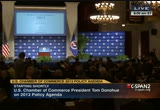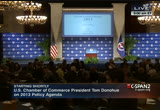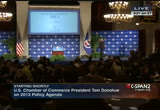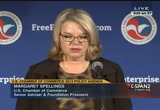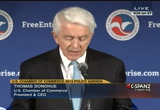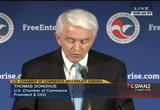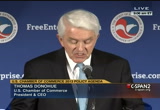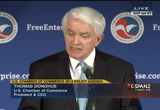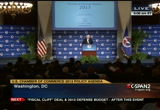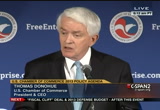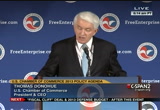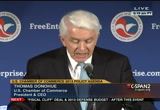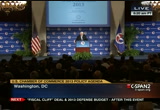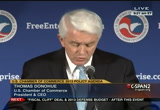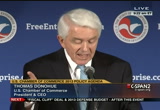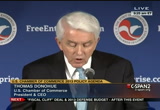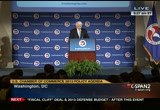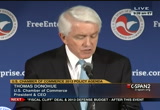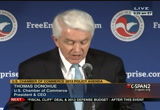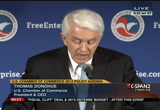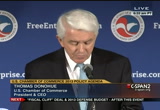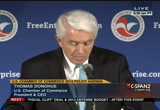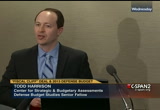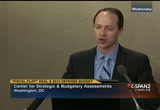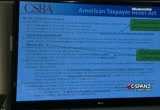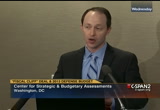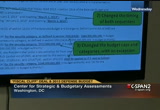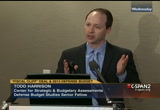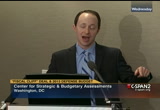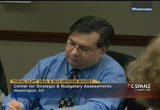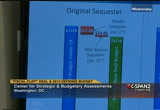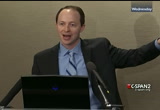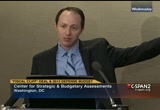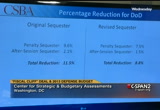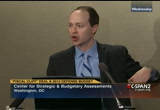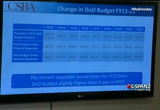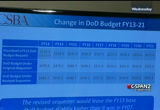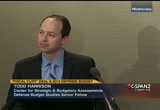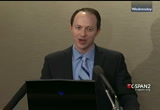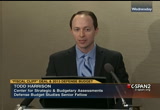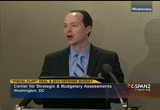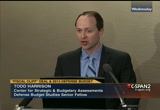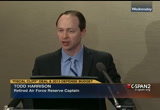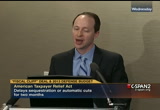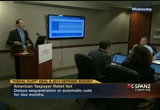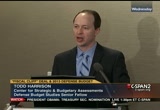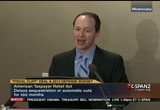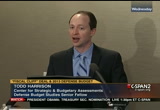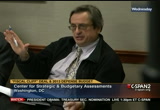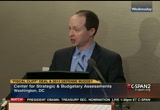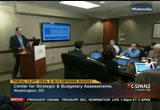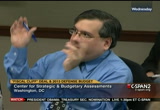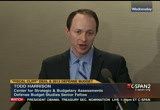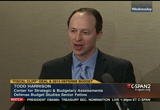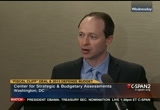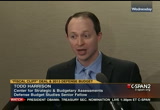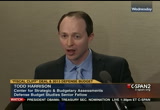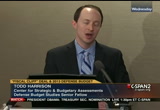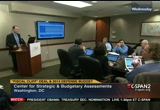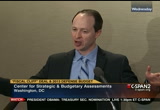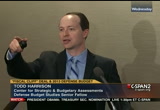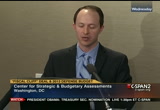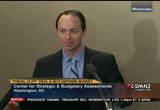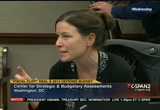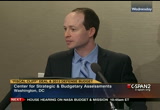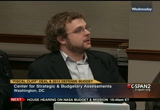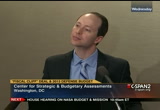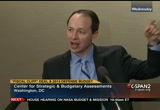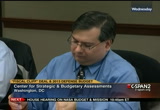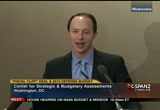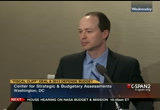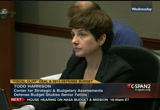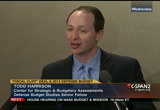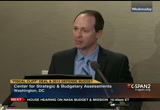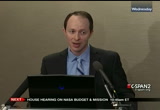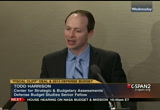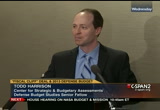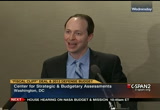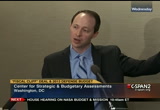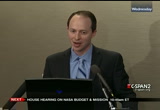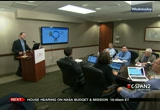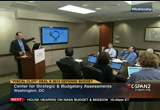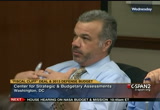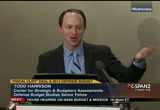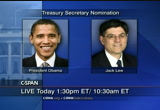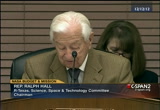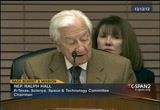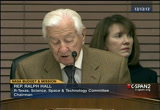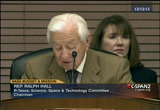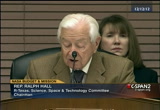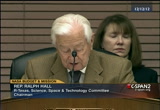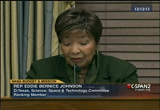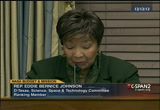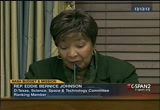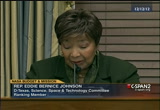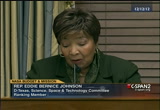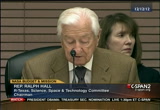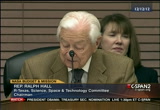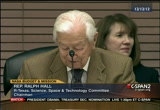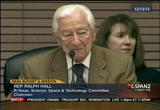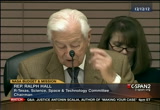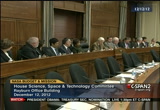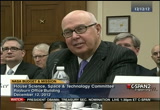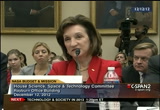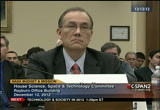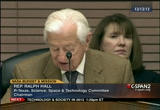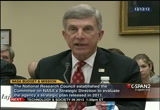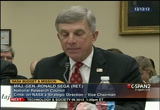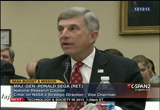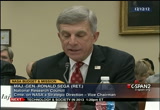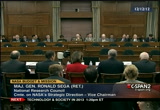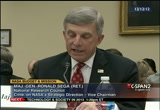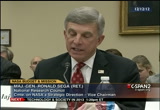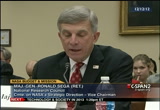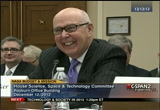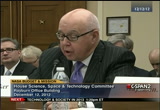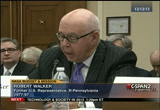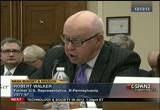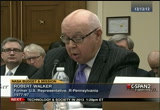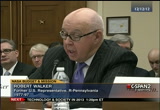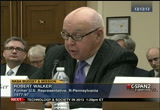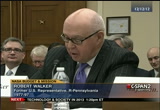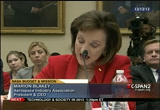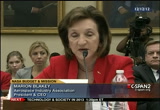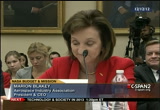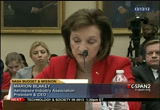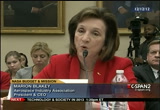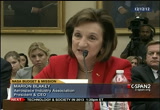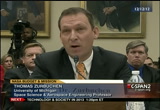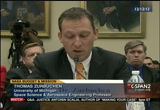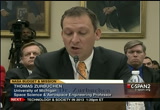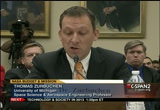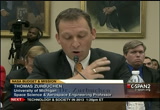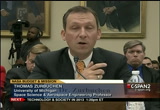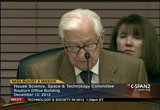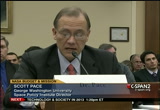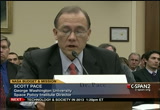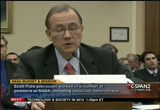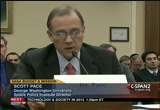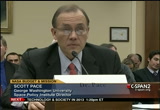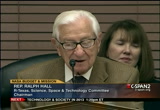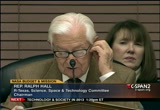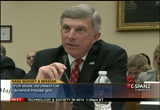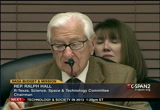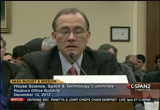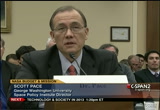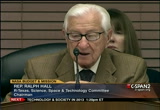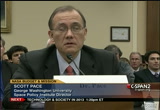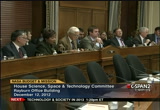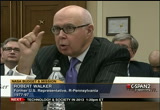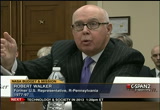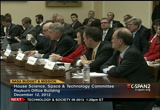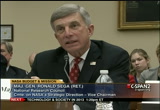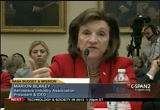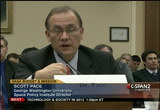tv U.S. Senate CSPAN January 10, 2013 9:00am-12:00pm EST
9:01 am
9:02 am
foundation and we're pleased that you could join us today for the annual state of american business address. before we welcome him to the state of him to stick up like is a brief word about my friend and our leader, tom donohue. looking back over the past year, the chamber has had its share of increase and, of course, disappointments during an economically tumultuous and politically divisive time under tom's leadership, the chamber has pursued a proactive, positive and bipartisan agenda to grow our economy and put americans back to work. in a town where collaboration and compromise are all too rare, he reaches out to leaders on both sides of the aisle. when there is common ground he has been willing to work with groups whose interest in constituencies don't always align with ours. when it's come under attack, tom has tirelessly made the case for free enterprise and forcefully advocates for what he calls the greatest economic system ever devised.
9:03 am
and when others argue that america's best days are behind us, and its citizens and leaders are not up to the challenges before us, tom calls them out. 2013 marks tom's 15th year at the helm of this organization. every year it becomes increasingly clear and amazingly impressive for those of us who work for him that he doesn't ever slow down. he doesn't scale back. he doesn't rest on his laurels. he doesn't stop challenging himself, and all of us, to do more and to do it better. but today isn't about looking back. it's about looking ahead, about what we can and must do to make america a stronger and more prosperous country. tom's leadership style is reflected in the chamber's culture, and i know it will be reflected in our agenda in 2013. without further delay, please join me in welcoming the u.s. chamber of commerce president and ceo, tom donohue. [applause]
9:04 am
>> we have upped the pressure. ladies and gentlemen, thank you for joining us. margaret, i appreciate your comments. i will get even at a later date. i like to thank the national chamber foundation and their staff and our colleagues were putting this meeting together, and for all the effort they put into this important day. as many of you know, we would like to begin the new year by looking at how american business is doing, discussing the key challenges facing our economy and identifying the top priorities the chamber plans to work on. in some important respects the state of american business continues to slowly improve.
9:05 am
we believe the economy will grow throughout the year, and not fall back into another recessi recession. the chamber is forecasting growth of 1.5-1.75% for the first half of the year, gradually accelerating to 2.5% by the end of the year. on the positive side, housing is continuing to improve. europe seems to be stabilizing, and energy prices are steady. big companies at home and abroad are flush with cash, and looking for reasons to invest. on the negative side, the recent tax increases resulting from the fiscal cliff deal will hit successful small businesses hard, which will dampen growth and hurt job creation in the first part of the year. elicited by the chamber's latest survey of small business members, which you should have
9:06 am
at your place, there is significant uncertainty over health care regulations, taxes and deficits. last week's job report was mediocre. only 63% of our eligible workforce is even participating, and we don't see much improvement in unemployment throughout the year. so while our economy may be growing, it is a fragile growth, and not nearly strong enough to create the jobs americans need, or to expand their income. and now we face a series of new washington deadlines over deficits, spending, debt ceiling, sequestration, and a continuing resolution to keep the government running. we also faced other domestic and international uncertainties that
9:07 am
have the potential to drive down competence -- confidence and discourage job creation from a regulatory flood here at home to economic problems in europe and japan, to geopolitical conflicts that could erupt into war at any time. we must also be concerned about america's capacity for leadership and action, and not only in government. in this country, and this is a country that can still get big things done, do we have the leaders with the courage to put the country first ahead of their own careers, politics, ideologies and egos? can we find leaders in government who truly appreciate the role that the private sector can and must play in building a
9:08 am
new american prosperity? the inherited of economic growth should not be an afterthought. it should be job one. economic growth must be front and center here in washington, just as it is in many state capitals across the nation, led by innovative governors from both political parties. today, 23 million americans are unemployed, underemployed, or have stopped looking for work. a record 47 million people are poor enough to be using food stamps. median family incomes have dropped to 1995 levels. so in many ways we are going backwards. millions of new college graduates, many of them deeply in debt, can't find promising positions in their fields. what is happening to the american dream for them?
9:09 am
we see despair in urban areas where up to 50% of our young people don't even graduate from high school. we need to build an economy that gives them hope, too, from top to bottom we need more success in america. we need to nurture success, empower it, reward and celebrated. that's why the chamber will advance the american jobs and growth agenda this year. the overriding objective of this ambitious plan is to generate stronger economic growth in order to create jobs, lift income, and expand opportunity for all americans. we are fully aware that economic growth alone cannot solve all of our problems, not without growth we will not be able to solve any of them.
9:10 am
our plan contains many proposals and reforms which we will be discussing and advocating throughout the year. but in a short time that we have today, i'd like to highlight five key issues. producing more american energy, expanding american trade, modernizing our regulatory system, reforming immigration, and addressing the fiscal crisis with a bold plan that slows the growth of spending, reforms entitlements, and overhauls our tax code. let me begin with the fiscal crisis. because the next battles over our nation's fiscal condition have already begun. as i mentioned, congress and the administration are soon to face new critical deadlines around the debt ceiling, sequestration,
9:11 am
and they need to fund government operations. these deadlines will mean more uncertainty for our economy, our businesses, and for our financial markets at home and abroad. as they address these deadlines, policymakers must seize the opportunity to make real progress in the areas they neglected in the first fiscal cliff. first and foremost, that means controlling deficit spending through commonsense entitlement reform. the last debt ceiling increase was passed in august 2011. and that was a to $.1 trillion commitment. here we are 17 a month later, and to $.1 trillion is gone.
9:12 am
caput. and now we need another increase, how much longer can this kind of spending go on without adjustment? as a nation we must finally face up to the single biggest threat to our economic future, and that is our exploding national debt driven by runaway deficit spending, changing demographics, and unsustainable entitlement. if we fail to address this threat, automatic spending will soon consume every dollar the federal government collects, leaving nothing for education, national defense, or other essential programs. we have no illusion that putting our country on a sound and responsible fiscal course will be easy. it clearly will not. our government is divided and conflicted because the american people are divided and
9:13 am
conflicted. but we cannot ignore this crisis any longer. nor can our leaders. as important as economic growth is, we can't grow our way out of this problem, and we certainly can't tax our way out. what we must address is the fundamental reality that due to our aging society, and increased life expectancy, the entitlement programs written and designed for an earlier era must be revised. we are not talking about cuts in absolute terms. we are simply talking about slowing the rate of increase, and this can be achieved with reasonable adjustment phased in over a number of years. comprehensive tax reform is another essential part of the solution to our fiscal crisis. the right kind of tax reform will make us more competitive across the globe, and empower
9:14 am
our businesses, small and large, here at home. the right kind of tax reform will turbocharge our growth, create jobs and generate more revenues for government at every level. but make no mistake. while there are solid economic and competitive reasons to pursue it, tax reform cannot be seen as a substitute for spending we strength. our spending problems must be addressed before, or concurrently, with comprehensive tax reform. let me say word now about energy. now in all last fall the chamber talked about how fortunate we are in the united states to have a third bucket to draw from to address our deficit and debt.
9:15 am
the first bucket is spending. we've been talking about entitlement spending, defense spending. the second bucket is revenue. and if you have to depend on just those two buckets, it's going to be a real long and difficult day. so we need a third bucket. and its energy, which is the next priority that i'd like to discuss. proceeding swiftly and responsibly to develop more american energy can help us in measurably with our fiscal problems, but it can also do much more for our country. we have more oil, gas and coal than any other country, and we are now the largest single natural gas producer in the world. we are now in a position to export liquefied natural gas and coal, and us, reduce our trade deficits and bring billions of
9:16 am
dollars to the united states. the abundance of affordable natural gas is attracting good manufacturing jobs back to america, particularly in the chemical and and steel industry. all of this adds up to a lot of jobs, growth, improved national security, and more revenues for government. according to the american petroleum institute, oil and gas companies already account for 9.2% of all -- 9.2 million american jobs, and pumped more than $500 billion into our economy. this is just the beginning. over the next 20 years, energy can create millions and millions of additional jobs, spread out all across the country. in the last few years alone, shea elected that he has created 1.75 million jobs. between now and 2035, we can
9:17 am
double shale economic impact, double the number of jobs and generate a cumulative $2.5 trillion in new government revenues. to achieve these benefits, we need to safely opened up new land for exploration. we are foolishly locking away too much of our resources on land and off the coast that we should have access to. we need predictable and their regulatory environment. the federal government shouldn't pick the winners and losers, or subject energy projects to endless and duplicative views -- reduce. such roadblocks have stymied vital products, like the keystone pipeline, and that must be built. we shouldn't stop epa's -- we should -- shouldn't have said it that way. it's getting wound up a little
9:18 am
bit. we should stop epa's senseless and ideologically driven battle to ban the production and the use of coal. and we should continue with the next generations of nuclear power plants, and we should waste no time in pursuing research that develop alternative sources such as wind, solar, geothermal, and deficiency. that is where we have led the world. by fully embracing america's energy opportunity, we can accelerate growth, create millions of new jobs, free ourselves from less than stable global suppliers and create huge new revenues for government, which will help reduce our budget deficit. we also have an extraordinary opportunity to create growth and jobs through expansion of trade and investment and tourism. small and large businesses say
9:19 am
they really can create a lot more jobs without a lot more -- well, 95% of the people, their potential customers, let that side the united states come and we need to go sell them something. that's what a bold and aggressive trade agenda will also be a major priority for the chamber in 2013. we need to conclude the trans-pacific partnership agreement in the booming pacific basin. let's get high quality agreement, and let's get it done this year. the chamber has also been leading the fight for a trade agreement with the european union. we are gaining a lot of support for it, from business and government on both sides of the atlantic. negotiation should be launched without delay. in geneva, 50 countries have stated their intention to launch talks on on international
9:20 am
agreement to boost trade and services, which we strongly support. and to conclude any of these agreements, we must renew the president's authority to negotiate trade agreements known as trade promotion authority. as we pursue a more ambitious trade agenda, let's make sure it includes robust protection of intellectual property. the chamber's global intellectual property center will continue to lead at home and abroad to protect ip, and the millions and millions of high paid quality jobs it supports. our country should also make a major effort to attract more global investors, foreign investment already directly or indirectly supports 21 million american jobs. we will take more investment. we need a lower investment at
9:21 am
home to attract more business and visitors, investors and tourists. and we should negotiate more bilateral investment treaty to ensure that american investors are treated fairly overseas. now here's another big issue. we need to address the coming flood of new regulations that will discourage our job creators and damage our competitive edge and our global economy. when you consider all the new rules now pouring through the regulatory pipeline, and those still to come, it's staggering. the dodd-frank financial law mandates 447 new rules, and regulators have only finalized a third of them. the chamber is center capital markets will advance an agenda to make sure that we preserve
9:22 am
diverse sources of capital for our nation's job creators, by seeking fixes to those areas of dodd-frank that congress and the regulators simply got wrong. we will promote additional reforms in areas where congress has not yet acted, and we will seek to replace areas of dodd-frank that do not work and do not achieve their objective. on the environmental front, major epa rules imposed over the last decade cost more than $23 billion, and a new ozone regulation, listen to this, if implemented could cost american businesses $90 billion. is epa moves forward with rules on greenhouse gas emission and applies them beyond power plants and refineries, it could in snare roughly 6 million facilities in burdensome permitting requirements.
9:23 am
the regulatory flood appears to be particularly pronounced in the health care arena. the new rules and mandates in the health care law, not to mention the extraordinary confusion businesses are facing as they try to comply, could drive costs through the roof. and in many cases cause americans to lose the health care coverage that they have been accustomed to. all told, the federal government issues about 4000 regulations every year. it would be hard to convince any reasonable person that all of them are really needed. we need to do three a central things to respond to this regulatory flood. we need to streamline the permitting process to it takes too long to build things in this country, and to build -- the big reason is the months and even years and years that it may take to get a permit.
9:24 am
second, we need to modernize our regulatory system to bring more accountability to the regulator and restore the role of congress in the rulemaking process. the bipartisan regulatory accountability act, which passed the house last year, would accomplish these things and help ensure that rules are based on good data and sound science. third, we are going to see -- you're going to see a significant respond to expand the expertise of our law firm, the national chamber litigation center. and in other areas of our institution in order to deal with expanding regulation. our preference is always to work within the legislative and regulatory process. and we do that on a daily basis, but when rights have been trampled on, our regulators have overstepped their bounds, well,
9:25 am
we will then just take necessary legal action. now let me turn to something we should all care about any very important way, that's immigration reform. america has grown because we have attracted and welcome some of the most talented and the hard-working citizens of the world to our shores. immigrants teach in our universities. they invest and invent in our technological companies. they staff our hospitals. they care for our elderly and our young. they harvest our food and they serve in our armed forces. given are changing demographics, we need more workers to sustain our economy. support our retired population, and help us stay competitive. even with high unemployment, we have millions and millions of job openings that go unfilled.
9:26 am
either the workers come here to fill those jobs, or the companies will take those jobs, and others that go with them, elsewhere. some argue that we should do a better job of educating, training and putting our own people at work. damn right, we should. that's why the business community is fighting hard for school and job training reform. and it's why we are especially proud of our hiring the heroes program, which aims to employ and have the skills of our soldiers returning from the battlefield. since the launch of this effort in march 2011, we have held 387 hiring fairs for veterans and military spouses. more than 14,000 direct jobs have been created, and tens of thousands of others that we don't even know about. and many more placements are to
9:27 am
come. but we still need immigrants. we are locked in a global competition for the world's best talent. this is the competition that will separate the economic leaders from the laggards in the 21st century. the chamber is already teaming up with -- listen to this -- labor unions, faith organizations and ethnic groups, and law enforcement to build the coalition for comprehensive immigration reform. we believe immigration reform should include the following, and i'll be very quick. we need to secure our borders. everybody knows that. it's imperative to people and commerce flow efficiently and lawfully through our nation's ports and across our borders. in addition, our laws must be revised to welcome needed labor and talent into our economy
9:28 am
through thoughtfully designed, yes, worker programs. this includes provisional -- for less skilled workers but also includes expanding the cap for high skilled visas, and expanding green card where appropriate for foreign nationals who graduate from our colleges and universities with advanced degrees. we also need a workable, reliable national employee verification system. and we need to provide a path out of the shadows for 11 million undocumented immigrants who live in the united states today, provided that they meet reasonable conditions. as we have this important debate, let's remember who we are. and where our families would be today if earlier generations of americans have decided to slam
9:29 am
the door shut. the door to the american dream must always remain open. now, ladies and gentlemen, he for concluding let me underscore -- before concluding let me underscore there are other priorities i haven't discussed. but they are vitally important, and we will be working hard on them all year. our institute for legal reform will continue to fight against fairless litigation on the state and local level, and all the international front where people are going to sue american companies. legal reform is linked to economic development and jobs in a very important way. our workforce freedom initiative will encourage efforts in the states to maintain flexible and fair workforce rules, to adapt the right-to-work laws where appropriate, and to repair
9:30 am
seriously underfunded public employee pension and benefit systems. we are going to redouble our efforts to make the economic and moral case for reform our public schools and overhauling our job training programs. you know, every child, every young person, and every worker in america deserves the opportunity to succeed. and millions in our country don't have that chance. when i discuss energy development, i mentioned a positive impact on american manufacturing. in fact, the chamber is working with others and conducting an extensive inquiry into what the country needs to do to further expand the best manufacturing system in the world. and manufacturing jobs, to bring them here to america. and you'll see us advancing this important initiative as the year goes on. and anyone who knows me, or the
9:31 am
chamber, knows we're deeply committed to rebuilding american business structure. if we don't expand our infrastructure and make it more efficient, it is -- we can't grow our economy. and i remember that every day as i drive to work and plump my way along the washington street. congress and the president took some positive steps last year, and we've got to build on that in 2013. we all know that information technology is a critical part of infrastructure. america needs robust as well as cybersecurity protections, to protect our public safety and fought against disruptions to business operations, and utility services, and to prevent the loss of capital and intellectual property. so we will continue to urge congress to pass consensus oriented cybersecurity legislation that will truly enhance businesses efforts to
9:32 am
deflect and defeat cyber threats, and work closely with our government to get this done. so ladies and gentlemen, let me conclude where i begin, by underscoring the fundamental importance of economic growth. we must get this economy moving faster. growth of 1.5 or 2% is simply not acceptable. it won't produce jobs. america needs the revenues that government must have to reduce trillions and trillions of dollars of deficit. congress and the administration must focus their attention on this critical priority. every bill that is considered, every regulation that is writt written, every negotiation that is held, everything our elected and appointed officials do or say must be shaped in large part
9:33 am
by these simple questions. what does it mean for jobs? what does it mean for growth? to advance our jobs and growth agenda, the chamber will continue to strengthen and improve itself as an organization as an influential force, and as a powerful brand at home and around the world. we will, of course expand our grassroots networks to small businesses, free enterprise advocates, and federations of chambers in interested groups. while gearing up and refreshing our political program for the next election cycle. we are going to deepen our venue of experts and communicators, and of lawyers prevail in the battle of policy ideas, to reach new audiences with a message of economic opportunity, and to win
9:34 am
courtroom victories and regulatory relief. in the difficult environment of divided government, we stand ready to work with both parties. and within both parties with the administration and with both traditional allies and with adversaries, wherever and whenever we can find agreement. but we will not sugar coat or shy away from the disagreements that will inevitably arise. we are going to passionately defend the rights of business -- of the business community, and all americans, to speak freely, and to participate in the political and public affairs of our democracy without fear, without intimidation, or without undue regulation. and we will intensify our efforts to educate and explain
9:35 am
the workings of the principles of american free enterprise to citizens and government leaders, including the fundamental values of risk, a profit, of individual initiative, and of limited government. these values benefit all in a free society. business is not the problem. it's business that creates jobs, high quality, well-paying jobs, and jobs and businesses are the solution. our leaders in government need to understand this. we cannot enforce smallest in our policy. when the nation really needs big solution. so the chamber will proudly and vigorous -- vigorously represent the american community, and all the great debates that lie ahe
9:36 am
ahead. but we will reject narrow agendas, wherever they come from, and put the country first. we call upon all american leaders in and out of government to do the same. the chamber will stand squarely with those who do. thank you very much, ladies and gentlemen, applau. [applause] >> thank you, tom. thank you for those very inspiring words. ladies and gentlemen, thank you very much for being here today, and hope we'll see a lot more of you in 2013 at events sponsored by the u.s. chamber foundation. please exit the backdoor. they will be staff to usher your next-door into the briefing center where tom will hold a
9:37 am
press conference. this meeting is for press only. all others, please exit the building to the connecticut avenue exit. they will be staffed to help guide you. we look forward to seeing more of you in 2013 at the next chamber event. for a list of upcoming events look at uschamber.com. thank you [inaudible conversations] >> if you missed any of this precipitation -- presentation and it will be unveiled on the c-span the library. you are watching c-span2 with politics and public affairs. weekdays feature live coverage of the u.s. senate. on week nights watch key public policy events. every weekend the latest nonfiction authors and books on booktv. you can see past programs and get our schedules at our website and you can join in the conversation on social media sites. >> i think that that
9:38 am
collectivization of the mines of america's founding fathers is particularly dangerous because, as i said so often in the book they were not be collected enough. and presenting them as such tends to dramatically oversimplify the politics of the founding generation. and then it comes to be used as a big battering ram to beat people over the head with. in ways that i think are both historically incoherent and rhetorically unsound. >> professoprofesso r michael auslin on what he calls a deep historical flaws by conservative commentators in the use of america's founding history. he shares those views with david fontana on booktv's after words sunday at 9 p.m. and midnight eastern on c-span2.
9:39 am
>> hollywood's most famous movie stars lead the film capital to help the government sell war bonds. irene dunne, ronald coleman, heady lamar, greer garson all part of a contingent of some 50 screen celebrities giving their time and talent to lead the national war effort spent what we want to look at today is how popular presented the work. how was it represented in movies from the 1940s. how was it presented in comic books from the 1940s. how was it presented in athletic events from 1930s and '40s. how was it presented in tin pan alley's come in music from the 1940s? that this weekend on american history tv popular culture and world war ii with purdue university professor randy roberts, lectures in history, saturday night at eight and 10 eastern on c-span3. >> good morning, everyone.
9:40 am
>> todd harrison says he's not very confident congress to find another $2 trillion in cuts by march 1 to prevent sequestration. a senior fellow at the center for strategic assessment yesterday unveiled his report. >> i will go ahead and acknowledge that first but i'm going to step through the portion of the american taxpayers relief act of 2012. i'm going to step to just a section of the deals with sequestration and talk about what specifically it change. and i will walk through the numbers and show how the numbers changed. and then we'll talk about what this actually means for defense going forward in the next few months, and in the long-term as well. so i'll start here. this section of the law that deals with sequestration is actually only one page long. this is the actual text. this is all of it. it's one page, but it is very
9:41 am
dense and it does a lot of tricky things. there are three things that this law changed about sequestration that are really relevant to defense. first of all, it reduced the amount of the fy '13 penalty sequester. this is the first crunch of sequestration. is by far the largest, and this is the part that is the direct result of the super committees together to achieve the required deficit reduction back in 2011. you can see the underlying part here. it reduces the amount of total sequester, both defense and nondefense, by $24 billion, now, that total sequester half is divided between national defen defense, the '05 budget defense and nondefense, the rest of the discretionary budget. so that the $12 billion reduction, is for defense. the second thing it does is it changes the timing of both sequester, two parts of
9:42 am
sequestration but one that occurs as a penalty sequester sure one that occurs with a call and after session sequester. it changed the dates of those. it used to be the penalty sequester was going to occur on january 2, and that after session sequester was only two weeks later on january 15. this change that. so now the penalty sequester will occur on march 1. the after session sequester will occur on march 27. it just happens that march 27 is also the date that the current continuing resolution that are funding the government will expire. so by that date congress was either had to enact a new continuing resolution or a full-year appropriations bill, otherwise the government will shut down on march 27. [inaudible] >> i think it is well plan. so by that point we should have some other appropriation measure in effect. so the after session sequester basically goes in.
9:43 am
i'll show you this graphic their big egos and make sure that even after the penalty sequester, whatever level is appropriate, still sits under the revised budget cap. it is very hard to get around the cuts that are in your without directly changing this. [inaudible] >> so the penalty sequester is the initial cut. that is the direct result of the super committees failure. it is something that is unique to fiscal year 13. i think you this initial cut, and it really is, it's a penalty because the supercommittee failed. it happens first to the after session sequester is basically enforcement the budget caps. the after session sequester, it only happens if you exceed the budget cap if you're already under the budget cap by that point, if congress passes an appropriations act of by march 27, that leaves the department under its budget cap at the point they will be no
9:44 am
need for a sequester it's basically a checkup at that point. if you're still over at a catcher even more to make sure you stay below the cap. in all future years they would just be and after session sequester. if you exceed the cap then you get to pick if you don't exceed the cap, no cut. [inaudible] >> and i'm going to get that, next slide. so, it change the date of both of those questions. third thing it did, and if this wasn't obligated enough, this is where it gets really complicated. it changed the budget cap in the category with an exception. so the way the law was written before, it said that you had, it defied the discretionary budget into security and on security. and it said that in the security category was, the department of defense, homeland security, veterans affairs, and the
9:45 am
national nuclear security administration. that make up the security budget. nonsecurity was everything else, discretionary. then the law. then a loss at all, if the boot committee fails -- if the supercommittee fails, we will change. so after the supercommittee failed, then the definition of the categories changed. now security meant the '05 budget function, that's national defense, that is, 95.8% of that budget function is the department of defense. ..
9:46 am
>> you had the narrower definition of the security category, and it was only a $556 billion cap. so this law comes in and says, all right, i'm going to do two things. i'm going to reduce the budget caps, right in and for fy-13 only and only under the after-session sequester, i am going to change the definition of the security category back to the original definition. so it's only for the after-session she quest or, not the penalty sequester, and it's only in fy-13 that they revert to the old definition. so why is that important? they reduced the budget cap in fy-13 by $2 billion, right? but by going back to the, in the after-session sequester, going back to that broader definition of security, they've widened the pool of resources over which that $2 billion reduction in budget cap applies. so they have diluted the effect
9:47 am
on dod a bit by doing that. so that actually means that dod will not be cut as much in the after-session sequester because of that. so i hope that makes sense. are there any questions about that? yes. >> they knew this when they did the cr, that they had violated the defense cap, right? so this is just their way of trying to remedy that, essentially. >> no, now they're in even more violation of it, because they reduced the cap. so they're still in violation of it. they reduced the cap. the broader security category is even more in violation, but the amount of the cut that results from that is less to do o d than it would have been under the old sequester. >> [inaudible] under this diluted version -- >> yes. this actually protects dod a little better. so so where do the cuts can come from? today, actually, can other parts of the discretionary budget are taking a slightly greater cut because dod is taking less of a cut here. all right. so now i'll walk through the
9:48 am
numbers of this and show what it means for the department of defense in particular. so on the left-hand side here, you see under the original sequester we're starting out with a base dod budget under the continuing resolution is $534 billion. the penalty sequester, the part of that that would be applied to dod, $52.4 billion. and then once you have this after-session sequester, you have to end up, the budget cap for dod would be $471 with, so you need to cut another $10.4 billion to get dod beneath that budget cap. so the total cut from both of these combined, $62.8 billion by my calculations. and that would have happened on the penalty sequester on january 2nd and the after-session sequester on the 15th. so with the changes that we just outlined in the law in the atra,
9:49 am
we still have, you know, under the continuing resolution we're still at $534 billion. the penalty sequester's been reduced, right, for the overall national defense category. it's a $12 billion reduction. but the part of that applied to dod you end up with a $40.9 billion penalty sequester. o so that's better than the $52 billion from before. then the budge cap, actually, look at that, it's a lot better. it ends up being $486 billion as the budget cap or for dod. so the difference between where you are after the penalty sequester and this revised budget cap is only about $7.2 billion. now, i will point out to you here that that $7.2 billion, and my cag calculation of -- calculation of that i put margin of error of probably plus or minus $2 billion. the reason for that is to calculate that after-session sequester under the revised law,
9:50 am
you actually have to know what all the other parts of the discretionary budget are being cut by under sequestration. now, my analysis i only focused on the defense part of the budget. i don't focus on, you know, the 2% cut in medicare that sequestration causes and all the exemptions that exist in the nondefense part of sequestration. so this is my best estimate. um, using the sequestration transparency act report that was published by omb, this is my best estimate for what this ends up being. but keep in mind that, you know, there is some margin of error in there if i am missing some examinations that might exist in other parts of the defense budget. so we used to you should the old sequester -- under the old sequester, dod would have taken a total cut of $62.8 billion, you should the new one, it's about $48 billion. now, in the comparison, comptroller hale said, i think, on monday by his calculations the old was $62 billion and the
9:51 am
new was $45 billion. in the budget world, i think that's close enough. [laughter] um, so i think we both admit that our calculations of the new sequester are not quite precise yet. the other factor to keep in mind in all of this is when you're calculating the amount of sequester, you have to know some things you won't necessarily know until right up before the time it happens. so such as when you go to calculate the percentage reduction across all accounts, tony, did you have a question? okay. if you go to calculate the percentage reduction required across all accounts, under the original sequester and under the continuing resolution the penalty sequester would have been about a 9.6 percentage reduction. after that you would have an after-session she quest of -- sequester of 6.1%. your told percentage reduction
9:52 am
would end up being 11.5%. under the revised sequester, the penalty sequester now has gone down to 7.5%. the after-session sequester has also gone down to 1.5%. total reduction now 8.8%. so about 9%. now, one of the uncertainties in calculating this is to know the percentage reduction you have to know the unobligated balances that are in all of those accounts. i'm using an estimate here. we don't actually know the unobligated balances until right before it happens because it depends on, you know, if dod happens to sign a contract on february 28th that obligates another billion or dollars, well, you won't necessarily know that that contract is going to be signed by that date until it happens. so this could differ. but i think this is a pretty good estimate of what we're looking at under sequestration, under the revised sequester. all right. and this is just for your notes
9:53 am
here. so what does the change do? what i've compared here on the top row is the president's fy-13 punt request for dod. so this is what the president put in his budget request that came out almost this time last year. the second line is what the dod annual budget would have been. this is just the base discretionary budget. the second line is what it would have been under the original sequester. the third line is what it would be now under the revised sequester. so i'd point out to you a couple of things. in fy-13 you see that the amount of funding dod would have is higher because the sequester is not as deep. but in fy-14 it's actually lower. this is part of how they paid for the delay in sequestration. so the total, um, reduction in sequestration i showed you at the beginning was 24 billion -- half for defense, half for nondefense. how did they pay for that?
9:54 am
because this was supposed to be a deficit reduction bill. they said, well, of that 24 billion, half of it's going to come from this change in the tax cold, something they're doing -- tax cold, something they're doing with roth iras. the other half they're paying for by reducing the budget caps. they reduced the budge p caps two billion in the security styled, two million in the nonsecurity side for fy-13. in fy-14 they're using the other definition, defense and nondefense. they reduced it by four billion in defense and four billion in nondefense. so it adds up to 12 billion in reduction in caps. that's why we see dod as not reduced as much in fy-13, but it actually gets reduced by about four billion more in fy-14, and then after that the numbers come back up and start to grow with inflation. they're the same as they would have been. in fy-15 to fy-21, they're the same as they would have been under the original sequester.
9:55 am
tony. >> [inaudible] 485 billion in -- [inaudible] earlier this year we're talking about the original sequestration we're taking the pentagon to the 2006 base level which is still pretty high. what does this mean? i don't have those figures handy. >> yeah. so if you look back and you adjust for inflation, under the revised sequester it would cut it to 485.7 billion. that would leave the dod budget slightly higher than it was if 2007. about eight billion higher than it was in 2007. previously under the other sequester, it would have gone down to about 471 billion. that would be slightly below the fy-07 level, closer to the fy-6 level of funding when you adjust for inflation. >> you're talking base budget, so there's a huge complication of oco here. >> yes. this is the base discretionary budget. war funding is interesting. i'll go back here.
9:56 am
when you're doing that after-session sequester and you are comparing how much funding is left to the cap, oco funding doesn't count. it doesn't count in that equation. so if you have additional war-related funding appropriated by congress, it does not cause you to exceed your cap, so you don't get an additional sequester out of it. but to complicate matters, when you are cutting, when your base budget exceeds the cap, the war funding is mixed into those accounts, right? so when you're calculating your percentage reduction, the war funding is part of what is being cut in those accounts. so it is not exempt from the cuts, but it does not count against the budget p caps. it is a the distinction. military personnel is the opposite. military personnel funding is exempt from the cuts, but it does count against the caps. yes. >> just when you said, when you go back to when you said the 24
9:57 am
billion was paid for, half presumably by this roth being an increase in revenues. >> right. >> and then the other half, that's, i guess, where i'm lost. because it sounds like instead of necessarily making any cuts, they just sort of shrank the, um, the amount of cuts that were previously expected. i guess, what am i -- >> they didn't actually increase the amount of cuts, because they reduced the budget cap. >> okay. >> yeah. so they -- >> pushed them off then. >> yeah. they pushed i want, they pushed it, in fy-13 they pushed it out, and they shifted the weighting of the cuts by changing the cap and the definition of security. they shifted it to fall more heavily on non-dod accounts. in fy-14 they just pushed the cuts out to that year. >> okay. so they pay for them later. these were future cuts as opposed to pregnant -- >> right. yes. >> personnel accounts, the claim was that personnel totally
9:58 am
exempted from sequester, you can see it counted under the cap. does that mean that personnel funds can be reduced? >> no, they don't get cut. they're still exempt from the cut, but they count against this cap. so the revised base dod budget cap under the revised sequester, 486 billion, military personnel accounts which is, i think, it's about $140 billion, is included when you're comparing and seeing if the base budget exceeds the cap. if the budget exceeds the cap and requires a cut, then all other accounts get cut except finish. >> which has the effect of actually increasing the -- >> from everything else. from operations and maintenance, from, you know, procurement, research and development, military construction, family housing, all of the other accounts get cut. and the other thing to point out here is, um, that did not change. the military personnel exemption did not change under this. the way the cuts have to be applied is a uniform percentage across all nonexempt accounts.
9:59 am
that did not change. this is still, you know, a blind, across-the-board cut. the third thing that didn't change is the defense health program is not exempt. that is tricare, that is military health care, military hospitals for active duty service members and their dependents, for retirees -- many of them under the age of 65 -- and their dependents. for people who get their health care through regular tricare and military facilities, that budget, the defense health program, is not exempt. it's not part of military personnel. it's part of o&m. and so it will be cut. a 9% cut in that budget will be about $3 billion. and so dod will have to figure out a way within the remaining seven months of the year to reduce that budget by $3 billion or reprogram the money from somewhere else and, of course, they would need congress if they're going to move, reprogram that kind of money. >> [inaudible] so the eight billion that's
10:00 am
pushed out to fy-14 as part of this deal, that's -- [inaudible] divided between defense and nondefense, and it's part of the sequester, it's part of the cap, it's not separate cuts that would be targeted or specified in any way? >> yeah. it's just part of the cap. the cap got lowered, and if your budget still remains above it, you have to be cut down to that lower level now. so in fy-13 if this happens, it will assuredly be an across-the-board cut. there's really no way to avoid it at this point unless congress changes this law. in fy-14 if this stays in effect, then dod and congress will know ahead of time what the cap is for that year. they'll know that your dod budget has to be $475.2 billion or less. they'll know that, and they could appropriate a level of funding that's within that. they could appropriate all the way up to 475.2, then there'll be no sequester, there won't be
10:01 am
these untargetted cuts across the board. if they exceed it, then you will have those across-the-board cuts of whatever percentage necessary to bring it down to the cap level. yes. >> thank you. the third sequester and the after-session sequester, in terms of administration of these funds what is the impact, for example, in contrast -- [inaudible] in employee furloughs? is that just an accounting thing, or does that have a real impact on how dod manages funding? >> this will have very real impact if this goes into effect. one of the first things we'll see, just like under the original sequester, dod will have of to start furloughing civilian employees. so i did some back of the envelope calculations on this. the 8.8% reduction that they'll have to take, the budget for dod civilian employees -- now, these are not contractors, and these are not uniform military,
10:02 am
these are civilians who work directly for the department of defense -- >> so civil service. >> yes, that's who we're talking about here. there are about 791,000 full-time equivalents who work for dod in a civilian capacity. the budget for pay and benefits of these personnel is about 70 billion a year. those accounts will have to be cut by about 8.8% under the revised sequester. that cut comes off of the total level of funding for the year. now, you only have seven months remaining in the fiscal year to administer that cut, you know? by march 1st dod will already have spent five months' worth of the money in those accounts. so they have to make up that 9, you know, 8.8% reduction in the remaining seven months of the year. that means you have to reduce your payroll expenses for the remainder of the year by 15%. if you're going to reduce your payroll expenses by 15% further remainder of the your and do it
10:03 am
through furlough, that means you have to furlough virtually every dod civilian for the maximum amount of time you can under the law which is one month. so virtually every dod civilian employee will have to be furloughs for one month in the remaining seven months of the fiscal year if in goes into effect. that's one of the first impacts i think we're likely to see. but then, also, the other impacts are similar under the original sequester. you know, dod will have, you know, 8.8% less funding in all accounts, so pick your favorite acquisition program, joint strike fighter -- and, actually, it even breaks down even more than that. for the joint strike fighter, there are, there's an air force research and development funding line for it. that has to be cut by 8.8%. there's a navy research and development funding line for it, that has to be cut by 8.8%. there's an air force procurement line cut by 8.8%, the navy procurement line. all of those lines have to be
10:04 am
cut by 8.8%. pick another acquisition program, same thing. everyone is going to see tear fy-13 funding cut by 8.8% if this stays in effect. now, what will be, the effect be on industry? well, it's not an immediate effect, because on march 1st if you walk into a factory where they're doing work on a weapons system, all the work they're doing at that point is based on money that's been obligated already. funding that's already been obligated is not subject to the cut. it's just the budget authority for that year that's subject to the cut. so what that means is in the remaining seven months of the year, all of these accounts are not going to have as much money left over that they can obligate. so they're going to have to delay contract awards possibly until the next fiscal year. in some cases they may have to reduce quantity. and if they have a contract signed that has, you know, options that they can exercise to buy an additional quantity, then that means they'll have to go back and renegotiate that
10:05 am
contract and develop options and lower quantities. what happens then? if you buy the lower quantity, your unit price goes up. because many of the weapons systems that dod buys, they are unique to dod. so dod is paying whether through fixed price contracts or through cost reimbursable contracts, dod is paying for the industrial base that supports it. so if you've got, you know, say raytheon builds the tomahawk cruise missile, we buy about 200 of these a year. with this cut, we'd be able to buy about 9% fewer, we'd have less money for the fiscal year. the navy's got a contract set up with them with pricing that we would buy at a rate of about 200 a year. if you say, well, we need a reduced amount, raytheon is going to say, okay, i've got the whole fixed cost of my production line, and you want me to divide that by a fewer number of missiles. the unit cost per missile is going to go up. so you won't just be able to buy
10:06 am
9% fewer missiles, it'll be more than that. the reduction will be further. because unit prices will go up. so the long-term effect on industry and dod is that it will reduce dod's purchasing power in the future. unit costs are going to go up. and not to mention it's going to cause all sorts of contract modifications and renegotiations, it's going to create a backlog of contracting work and back to the first point, the civilian workers at dod who process those contract modifications, they're going to be furloughs for one month at some point in the remainder of the fiscal year. so this is going to be a contracting nightmare for dod. >> an important point here. you're basically verifying what the pentagon has been saying on the 800,000 employees. when this first came out -- [inaudible] a week ago, they waxed and waned. it was, oh, it wouldn't be all. all would be notified, but only some would be furloughed and then george little kind of said, no, all would be furloughed.
10:07 am
you're basically verifying it's not a horror story, they're not crying wolf here. basically, all -- [inaudible] at some point in the year would be furloughed if this played out. >> yeah. using my back of the envelope calculations, i can verify that. it is virtually if not every single, last person, it is nearly every single person that is employed as a dod civilian would have to be furloughed by, for the full amount, a month, in order to make up the budget cuts that those accounts would be receiving. the other alternative, i mean, there are a few other alternatives that would give them some head room. they could, basically, implement a hiring freeze and reduce their work force, you know, by having a hiring freeze so you have attrition. people leaving, you don't hire anyone to replace them. so that would give them a little more head room. the other thing they could do is actually start laying off people. but my understanding from dod is they've said that that is a last resort. they don't want to start making permanent reductions in the work force as a result of a temporary
10:08 am
sequestration. >> [inaudible] they put this claim on right when the negotiations were ending? versus three or four months ago when the public could have had a better sense of the debate? >> i was surprised. and i think that's a result of dod did not start doing their detailed planning until, basically, december. mate -- late november, early december. and they're just coming to realize some of these immediate impacts pretty late in the game, quite frankly. i think, you know, it would be a good public service for dod to continue that detailed planning now and start to go public with it where it's appropriate. so, for example, before march 1st they should go ahead and publicly notify all of their dod civilian employees about their furlough plan. if sequestration happens, they should tell people this is what's going to happen, here's how we're going to implement the furloughs. you know, if everyone has to be furloughed by one month, it's not all at the same time, so go ahead and tell people, okay, here's who will be furloughed in
10:09 am
the first month, here's who will be furloughed in the second month. go ahead and make that planning public. i think that would help inform the public debate so we can make a good decision as a mission about what we want to do. yes. >> strategically from, i guess, from the 30,000 congress level appropriators would like -- [inaudible] if i could just, is it the fact that by pushing back when sequester would take effect that there's so much -- the amount of time left in the year leaves you with no choice but to look at furloughs? in other words, is there sort of a -- unlike other agencies which could cut training or travel or something like that to try and hit their targets, that basically by pushing this back where there's only so many months to make that up, there's no choice but to say everyone's furloughed? >> it was true under the original sequester with the nine months as well. if the sequester had taken place
10:10 am
in october, some furloughs would have been necessary. so i don't think it's a matter of so much -- >> [inaudible] >> i think it's just a matter of the way the cuts have to be executed as a uniform percentage cuts across all accounts. it doesn't give you flexibility to do smart things. things like travel budget, that will be cut as well -- [laughter] by 9%. so everything's going to take a hit. now, you know, the option to help minimize some of the negative effects here is dod could put together a reprogramming request and say, okay, all of these accounts have been cut by the same amountful we want to go back and move some must money around. so we're willing to cut some accounts more deeply to put money back, restore funding to other accounts. that would be a smart move as well. that's something they should start working on now, start working on it in advance even if they don't release it publicly. but if sequestration goes into effect, i would hope be willing to go to congress pretty quickly with a reprogramming request and say, hey, you did this to us.
10:11 am
everyone agrees that the across-the-board cuts don't make sense, that that's astrategic. here's our first shot to minimize the damage by reprogramming money. here's what we'd like to do. yes. >> on that reprogramming, bob hale seemed pretty skeptical this week on how much they could do for that across the boardness. that wasn't clear if that was clinical analysis or whether there's limitations in the law about how much they can do with reprogramming. >> it's not a matter of limitations in the law, but it's a limitation of what congress would be willing to go along with. and, you know, i think he raises a fair point that you would, if you're doing a reprogramming request, you are asking to cut some accounts even deeper. so accounts that have already been cut by 9%, you're asking to cut them even deeper to restore money to other critical areas. there are a few things that i think they're going to have to do like the defense health program, they're going to have
10:12 am
to find $3 billion. so you look around all the other accounts that have already been cut and try to come up with another $3 billion to put back there. if you want to reduce the amount of furloughs for dod civilians, you know, you're talking a big bill. we're talking about, you know, in the neighborhood of $6.5 billion you would need to avoid any furloughs of civilian workers. that's a lot of money, also, to come up with. there's some major acquisition programs where this is going to be particularly disruptive, and it could, you know, severely impact, you know, these programs not just in the first year, but in years to come. and it'll significantly weaken dod's negotiating position with some of the firms involved. i'll give you a great example. the boeing aerial refueling tanker, kc-46a, that, you know, first of all should mention we're still under a continuing resolution, so that program like many other programs where funding was supposed to be ramped up, it's stuck at last year's level.
10:13 am
so it's already a billion dollars short in that program. but if you add sequestration on top of that and even if you appropriate, you know, a higher level for the year once they replace the continuing resolution, um, you're still left short. well, we had a contract we signed with boeing and a rate at which we were going to buy those tankers coming off the production line. now you're cutting that tunnelfunding. we can't keep can up our end of the contract. now, it's been reported that boeing bid very competitively to win that contract, and they are losing money on the early phases of it. when we have to go as a nation and renegotiate that contract, do you really think we're in a good position to maintain such a competitive price if or is boeing going to walk out of that negotiation in a better position, perhaps not losing money on the contract anymore? so you've got to look at this, and there are some areas where it really is going to be bad for dod if they have to e quester -- sequester these
10:14 am
accounts. >> well, the easiest places to cut in the short term is o&m, operations. you know, a severe cutback in training and that sort of thing? >> yes. some of the options you'd have to look at are, you know, if you've got major live-fire training exercises scheduled for the remainder of the year, you could delay it til next fiscal year. if you've got major maintenance of weapons systems, major platforms that you were set to begin later this year, you could delay that until the beginning of the next fiscal year. you could do a lot of delaying, and, you know, you could get away with that, perhaps, in one year. but then now you've got a backlog building next year. and if this stays in effect, then you've got even less funding the year after that. so the backlog starts to build. so what it will force you to do, you can't do it in fy-13, but in fy-14, you'd have to start making some really hard choices and reduce your force structure,
10:15 am
reduce your personnel, basically, shrink your military, and you'd have to do it quickly. so you'd have to use quick options to downsize your force which aren't always the best and most strategically-informed options. next question. >> going back to your example of the fueling tanker, is there any particular service, army, navy, marine corps, that is most vulnerable because of the number of acquisition programs they have that are at a key point right now? >> yeah. i mean, they're all vulnerable in different ways. you know, i wouldn't want to hazard a guess at when one is the most vulnerable. you know, i mean, the air force looking at their budget they have a number of programs that they say are critical to the future, things like the tanker, things like the f-35, obviously, things like the next gen bomber. these programs are, you know, of critical importance to the air force to recapitalize their inventory of aircraft for the future and be better prepared
10:16 am
for the threats of the future. all of those programs are in the early stages of development still, so they're all particularly vulnerable. but, you know, they could probably go true through the navy, marine corps and the army, and they have programs that are in the same situation. >> two questions about the whole contracting aspect of it. i mean, on the one hand, you know, how bad do the penalties potentially get for -- things like that you were going to renegotiate on bad term, you're going to pay penalties for breaking contracts, etc., so that's potentially, you know, in order to cut one dollar, you may actually have to pay two dollars. and conversely, you know, are there ways to gain when you sign contracts and what the unobligated balance is so you can mitigate some of the effects by basically screwing around with industry and saying, oh, we are going to sign the contract at 12:01 a.m. instead of 11:59
10:17 am
p.m.? >> yeah. so on the first point, there won't be many terminations, if any, because of the first year of sequestration because no account is getting cut to zero. they're all getting cut by about 9%. so you don't necessarily have to terminate anything. what you would have to do in many cases is renegotiate the rate at which you're going to buy in the coming years. but in terms of how you can game the system, if you are a program manager, you know, for a particular acquisition program, you have an incentive to get as much of your funding obligated by march 1st as possible. once it's obligated, it's not summit to the sequestration cuts -- subject to the sequestration cuts. now, if you are, you know, ash carter or the sec def and you're looking t at this from a dod perspective, you don't want a lot of people obligating a lot of money because that narrows the pot of money. so the percentage -- if there
10:18 am
were a significant amount of early obligations, the percentage cut to all the remaining funds will go up slightly. so from a macro perspective, you wouldn't want people to do that. but if you're down on an individual program, you know, if you're self-interested, you would want to obligate as much of that funding as you can by march 1st. and we did see, it's hard to say if this was a result of the previous sequestration deadline, but we did see a lot of contracting activity in late november and december all the way up until december 28th just, you know, heading up to the january 2nd sequestration deadline that we just avoided. so we may see a repeat of that. it may be even more of a flurry of contracting activity. yes. >> so what challenges does the -- [inaudible] pose to the fy-14 budget planning process? i know they said they were going to delay their mission a little bit later than normal many --
10:19 am
this year. >> there's two real impacts. the fy-14 budget request was supposed the come out the first monday in february, so just in a few weeks. the problem is, number one, you still have sequestration -- actually, three problems. you still have sequestration lingering over you, so you don't know if you're going to be cut by, you know, about 9% this year. the second thing, we're still under a continuing resolution. congress has not passed a full-year appropriations pill for defense, so we don't know what the actual amount of fy-13 funding will be even without sequestration, you know? and so the third problem is that the fy-14 budget cap has been reduced. so they planned for the old budget cap assuming, also, that sequestration didn't occur. so it's higher than it would be under sequestration. now that budget cap has been reduced by $4 billion for defense. so they have to go back at a minimum if they want to be in compliance with the budget cap, they've got to go back to their
10:20 am
budget request which was basically finalized. it was almost finalized at this point. and find another four billion to cut. and that still would assume sequestration doesn't happen, and it would still assume that the fy-13 budget request eventually gets passed by congress. so there's good reason to delay putting out the fy-14 budget request. the problem you run into is, well, when are we going to have certainty about those things? are we going to have certainty by march 1st? we may have certainty that e sequestration doesn't happen if they find a way to replace it. are we going to have certainty about the fy-13 level of funding? probably not until late march at best. worst case scenario, we could go into sequestration, and then you'd have the uncertainty of is congress going to turn it off or not. we could go all the way to march 27th, and we could be facing a government shutdown. and so, you know, there are a lot -- we would have a tremendous amount of uncertainty about the fy-13 level of
10:21 am
funding, or we could be under another continuing resolution that extends it even longer. yes. >> i think you just said the four billion that would be moved to fy-14, that would happen regardless of whether sequestration happens or not? >> yes. the way the caps work, you've got an initial cap. now, the fy-14 initial cap has been reduced by four billion. if sequestration goes into effect and stays in effect, that gets reduced by the amount of the penalty she questions e. so the cap gets even lower. either way, if sequestration itself is avoided, if the budget caps stay in effect, it's less than they were planning on. >> okay. is there any doubt in your mind that the across-the-board cuts would be at the tpa level? whoo's your understanding of whether -- what's your underring of whether it would be tpa or not? >> it's been applied several times before. based on that precedent, i would say that, yeah, it's going to be
10:22 am
applied at the program project activity level. it'll be the lowest level at which congress appropriates money. that's what the law says. i don't see how they could interpret it differently at this point. >> todd, not knowing or maybe you know what they're going to do on march 1st, but not knowing -- [laughter] >> my crystal ball is hazy. >> so is there any scenario out there that would change the budget caps for the out years? i mean, is that something that is contemplated under any scenario? >> it is. um, if they, if they come up with some sort of a deal to replace sequestration, that deal could include changes to the budget caps in future years. it very well could include that. so it's possible. >> i mean, for defense does that mean that they would have to find cuts elsewhere in the discretionary budget, or -- and that would help defense and vice versa? >> it could work both ways.
10:23 am
so they could avert sequestration, the immediate, you know, cuts at the lower level, the 500 billion over ten years. now 500 billion minus 12. [laughter] they could avert that. but then they could change the budget caps to either be higher for defense or lower for defense. so part of the way they might pay for averting sequestration is by reducing the budget caps for defense by some amount of that 500 billion and then reducing other spending by some other amount or raising revenues to make up the difference. so there's a lot of ways they could do it. you had a question. >> so, um, we get ten billion or so less for -- [inaudible] in a shorter time period. do you think that's better or worse for dod if they actually have to implement it as opposed if it had actually gone into effect in january? >> i think it's about the same overall. it is less time to implement it, but it is a smaller cut. i think it's really -- they made it no better for defense, they
10:24 am
made it no worse really. um, we are talking a difference, you know, of a few billion here. you know, it is -- they did get less of a cut proportionately given the delay, but not by much. and so i think this is still, it's going to create a real mess for dod. now, to be clear, i don't think this is the apocalypse. you know, i don't agree with a lot of the, you know, really over-the-top rhetoric that's been coming out about this. i think it forces a lot of really stupid discussions. i -- stupid decisions. i think it is shortsighted, but it's not the end of the world. we'll survive it if it happens. yeah. >> if they manage to get a deal to avert sequestration, there's still a lot of support on capitol hill for cutting defense. so what do you envisions would be the size of a potential cut under that kind of a deal, and would it make the situation very
10:25 am
much different? in other words, would it, would it still with a mess -- still be a mess after the rest of fiscal year 2013? >> if they came up with a deal to avoid sequestration but it included additional cuts to defense, i think we'd be looking at, you know, instead of a $5 billion cut over ten years for defense, i think we might be looking at somewhere in the neighborhood of 2-300 billion, and then other things in the budget to offset the rest of it. and depending how they write that in there, if they write it in as a gradual rampdown over time, that would be a lot better for dod. it's the abrupt cuts, you know, the way it's written right now these caps fall abruptly in the first year and then, basically, grow with inflation the rest of the time. if you have a more gradual rampdown at about 1-2% real decline per year, that would give you significant deficit reduction, and it would enable dod to start making smart,
10:26 am
strategically-informed choices about what they put in their budget request each year. still there are hard questions that have to be answered, hard decisions that would have to be made, but it would be a lot better, much more rational process. and anything you can do to avoid this, you know, the across-the-board cuts would be a dramatic improvement for dod. >> yeah. i was going to say along the same lines, you guys have talked about this idea, the 2% real cut year-over-year having the same impact as at least the original sequester outline. have you run the numbers on what that 2% real would be versus these revised sequester? >> it ends up being about the same because the change here in just the first two years was so small relative to the 500 billion. so it's still -- if you gradually reduce the defense budget from its current level at a real rate, the inflation-adjusted rate of about 2.2% per year over the rest of the decade, you will achieve the same level of deficit reduction as under these budget caps.
10:27 am
that's a much more rational approach. and then dod can start doing things that require time to achieve savings. so there are things you can do, efficiencies you can achieve if you have time. if you have to cut immediately, you don't have time to do those things. so, for example, you could do another round of base closures, and you could really close bases and not just move them around. but even if you're just closing bases because your force is getting smaller, it still costs you some money up front to actually shut down facilities, to move personnel when you need to and to do a lot of environmental remediation which is necessary to a lot of these bases. costs you money up front, but then it'll start saving you money within the next 5-10 years. now, the 2005 bracket's not a good example of that being successful. but previous brackets have been successful at actually reducing facilities and bringing down costs over the long run. so you could start to do smart things that by the end of the decade are really safing you money. >> still be competitive then in terms of overall savings in ten
10:28 am
years? >> right. and the other thing to point out is the 3.2% annual decline over a decade, that actually is pretty close to being in alignment with previous drawdowns. like we saw at the end of the cold war, the end of vietnam. you know, that's the kind of drawdown that, you know, we've seen in the past. and if you do it smartly and you're actually willing to make hard, strategic choices, you could at the end of this come out better positioned with a military that is smaller in some areas, but stronger in the areas that are most important. but, you know, you have the make cuts that aren't fair and balanced. you have to make cuts, um, that are strategically informed, and, you know, might angerrer some key constituencies. yes. >> i know you really don't want to look in detail at defense, but can you say anything more about what the added cut to nondefense discretion nature would be in the -- >> i did not look at that, so i can't really say. it would be slightly higher
10:29 am
because of what i told you about what they're doing with the budget caps in the first year. the cuts would be proportionately deeper in the other areas of the -- in the nondefense discretionary budget. yeah, back there. >> congress as being any more open to -- [inaudible] this year than they were last year in and you mentioned that the 2005 brac was not a good example. mr. hale said the same thing the other day, but what has changed that would make that any different this year? >> um, if we, if we run into another real crisis like we have looming right now, that might change people's minds. the other thing that's changed is we had an election, so we're not in an election year. so this might be a better year to have a serious discussion about a good, rational round of brac. >> i mean, some of us have been saying, you know, if they do this, they have to do that. just to draw this out, i mean,
10:30 am
all -- as i think you mentioned the other day -- all this is completely self-imposed. if congress decides by a majority vote of both chambers and the president signs it they can change the caps, change the debt limit, i mean, congress could say let's double defense budget and do it all by borrowing money or by raising taxes on left-handed armenians. well, i guess that's against the 14th amendment -- [laughter] short of violating the constitution and reissuing slavery, the congress has complete discretion. they can change as many of these numbers they want at any time. >> absolutely. all of this is artificially imposed, but it is the law, and as long as it's in effect, it is binding. congress could come back, absolutely, they could change any part of this any way that they wanted. you know, they set their own rules, they make their own rules. but these are the rules they made. and i think the trouble is, you know, getting some sort of change to this that people on
10:31 am
both sides of the aisle will agree to in sufficient numbers to actually make it pass. tony. >> senator hagel's likely if he's confirmed to be secretary of defense by march 1st. what kind of leadership challenges does this pose to him? what -- can he do anything to ameliorate it or send out signals -- if he says this is going to be his first-day challenge, what not advice to him, but where does he control the debate at all or the actual consequences? >> yeah. i don't know that there's a lot that the sec def -- whoever it is at that time -- can really do other than try to be, you know, straightforward and open with the congress and the american people about what the real impacts are going to be. not the hyperbole, not just talking points, but coming out with what the real impacts are going to be and let people know and make an informed decision about what's best for the country. i think that's about the best that any secretary of defense
10:32 am
could do in this situation. and i actually want to go on. my last slide here before we close, i know we're getting close to 11:00, is, you know, you put all this together, and what we have coming here in the next few months, i think, really is madness. so we're looking at in late february or early march the treasury has said that they're going to be running out of options to avoid breaching the debt ceiling. so we could be, if congress does nothing to increase the debt ceiling by then, we could be looking at a government default. not -- even if it's not a government default on our debt. even if the treasury says we're going to prioritize principal payments, we are still looking at a default on our government obligations. that means that the treasury, the government and the department of defense included, would have the ability to go out and spend money. the treasury would not be able to write the checks to pay the obligations that those agencies
10:33 am
have made. so that could include, you know, dod civilian, uniform military, contractors. they would be expecting a check in the mail or deposited in their account, and it just wouldn't show up. you know, that would be true for all the nondefense parts of the budget as well; social security recipients, medicare, doctors expecting reimbursement. the checks just wouldn't show up for about 40% of the dollars the government was supposed to pay out if we actually go into a default situation. obviously, that is a major threat to our economy, and i argue in this analysis that it is also a threat to our national defense. every major war of the united states ever fought has been financed -- at least in part -- through borrowing. and by going into a default and not being able to pay our obligations for the first time if -- first time in history, we would put at risk the full faith and credit of the united states government. the treasury has said this, major economists have said this.
10:34 am
if you do that, not only would you increase our borrowing rates, you may get us to a point that in a future crisis whether a national security crisis or a natural disaster we simply might not be able to borrow sufficient funds to get us through. i think that is a national security risk. the other big thing happening is march 1st and then again on march 27th we're going to have sequestration go into effect unless congress does something to change it. and, obviously, we've talked at length about that. and then on march 27th the continuing resolutions currently in effect expire or, and if congress does nothing by that date in terms of appropriations, we'll be facing a government shutdown. now, it's important to note a government shutdown is fundamentally different than a default or sequestration. under a default the government continues operating as normal, we just can't pay all the bills. under sequestration everything gets slowed down. defense, nondefense, they all get cut, you know?
10:35 am
and defense b would be about 9%. under a government shutdown, work stops. all nonessential workers and activities have to be stopped. you know, we've been in a government shutdown multiple part-times in the '90s -- multiple times in the '90s. sequestration, we've had that happen in the late '80s and early '90s, so we know what to expect from that. government default, of course, unchartered territory. i think what is unique about this moment in american history is we've set up self-imposed deadlines where if congress does not act, if they do not pass legislation in the house and the senate and get the white house's signature, if they do not do it by these deadlines, we could face all of these things happening at the same time within a period of about a month. that's march madness. and that's what i hope we can avoid. you know, sequestration is a part of that. the deadline of march 1st of sequestration, the new deadline, i think implicitly ties any
10:36 am
resolution of sequestration to the debt ceiling debate. now, you know, some in congress have said for every dollar increase in the debt ceiling we want a dollar in spending cuts. by the way, sequestration is a result of that same philosophy the last time we hit the debt ceiling. the republicans in congress at that time said that they wanted spending cuts to equal the amount of increase in the debt ceiling. congress could not agree on what specifically to cut for that full amount, so we came up with sequestration as a forcing function to make that happen. so these are, sequestration cuts are cuts leavitt over from the previous debt ceiling increase. now we're facing another moment where every to increase the debt ceils. if you want to increase the debt ceiling enough to give us about a year of operating time, that'd be about a trillion dollars. if you want to completely offset the cuts in sequestration with other deficit reduction, that'd be another trillion dollars. putting these two on the same timeline doubles the problem.
10:37 am
i'm not confident congress can come up with another $2 trillion in deficit reduction by that deadline. let's keep in mind with the fiscal cliff, um, relative to what would have happened if all of the tax rates and everything, all the other programs had been extended, if they'd just extended all of the deadlines, what they ended up passing reduced the deficit by less than a trillion, about 700, $800 billion in deficit reduction. look how hard that was. if we're going to raise the debt ceiling and offset sequestration, it's more than twice as hard to do that. so i, i am not confident that congress will be able to do both. i think the debt ceiling is clearly the priority. um, so, you know, i think there's a good chance. i'm optimistic that they'll be able to increase the debt ceiling and avoid the worst consequences of government default. i'm not confident, though, that they'll be able to reach additional deficit reduction agreement to alter
10:38 am
sequestration. i think that both parties in the negotiations may end up looking at sequestration and say, you know what? this is bad, this is not what we want, but it's probably better than any other deal we could negotiate with the other side. >> $2 trillion would almost have to require entitlements -- >> i think either way they're going to have to start looking at entitlement programs when they're looking for additional deficit reduction. i think republicans in congress are going to insist on that. and they did start to approach some, you know, entitlement programs. social security we're talking about here, medicare, medicaid. they did start talking about cuts in future funding levels for those programs in the fiscal cliff negotiations. but that, as -- at the end of the day, was taken off the table. >> i just realized there's a cascading effect. if every time you raise the debt limit you have to offset that with cuts and you raise the debt limit for a year, you have a trillion dollars of cuts over ten years, then by the end of
10:39 am
ten years, you have to have $10 trillion of cuts to keep raising the debt limit at that rate over the next century? i mean, where -- the math a of this sort of compounds in a way that's impossible to -- >> well, at some point your cuts on top of cuts on top of cuts would have cut your spending to a level that you wouldn't be borrowing anymore, so you wouldn't need to raise the debt ceiling anymore. [laughter] and then perhaps maybe as your debt, you start to pay it off as more and more of those cuts kick in, perhaps you could reduce the debt ceiling and increase spending every time you reduce the debt ceiling. i don't know. but, yeah, it is kind of a bizarre scenario. but, you know, democrats have said that revenues are going to be on the table as part of their negotiating position. so it's not a given that if they try to do all of in the that all two trillion would come from spending cuts. some of that could come from additional revenues as well. >> how confident are you of if sequestration happens and it's
10:40 am
475.2, um, for fy-14 that congress would heed that amount? i mean, congress didn't stick with the budget control act cap, so are we going to a year later looking at adjustments because congress exceeded that cap? >> yeah. these budget deals historically don't tend to stick around unaltered for very long. so, yeah, i wouldn't read too much into the ten-year projections out of these things. even if sequestration goes into effect, even if they decide to let it take effect, in fy-14 this is going to be debated then, in fy-15, this'll be debated again. so the amounts could change. they could go up or down, quite frankly. >> o so as you're handicapping this, you see sequestration happening because of this confluence of events you're describing and the inability of congress to really do anything long term? >> i'm not sure if if it's the t likely outcome yet, but the odds of sequestration going into effect now, i think, have gone up.
10:41 am
the odds of a deal to change sequestration, to eliminate it, i think, have gone down. i think a delay is still a real possibility. they might delay it again by a month or two months. but at some point the delays run out, and you've got to do something about this one way or the other. but i think the odds of sequestration happening have gone up because of of the fact that they've tied it to the debt ceiling debate. and also keep in mind throughout all the fiscal cliff debate and the negotiations on what they're going to do there, it was only at the last minute that they added in something to they sequestration. it was only at the last minute. it almost didn't make it in there, quite frankly. so, you know, dod dodged a bullet one on this. there's another round locked and loaded in the chamber. i'm not sure they can keep dodging those bullets every time it comes. eventually, one of them's going to hit. yeah. >> do any kind of calculation of the cost of sequestration? >> the cost in terms of the
10:42 am
inefficiencies it creates? >> yes. >> you know, that would be hard to do. ask me in a couple of years if it's gone into effect, i'll come out with that report. [laughter] any other questions? i think we're past our 11:00 time frame here. thank you all for coming out. if you have any other detailed questions or anything, feel free to e-mail me or follow up after the meeting here today. thanks for coming. [inaudible conversations] >> well, president obama announces today his nominee for treasury secretary and mealed ya reports are saying it's white house chief of staff jack lew. he would replace treasury secretary tim geithner. that announcement is set for 1:30 eastern today. c-span will have live coverage. all this week at 6 eastern here on c-span2 we're featuring past q&a programsment today it's supreme court justice antonin scalia on his book, "making your
10:43 am
case: the art of persuading judges." it gives advice to lawyers. and then at 7 eastern, it's another q&a program, a conversation with neil barofsky. he's written a book called "bailout: an inside account of how washington abandoned main street while rescuing wall street." >> back in the heyday of the private student lending market, um, you saw a lot of families who weren't necessarily going to for-profit colleges. you know, their student was going to, say, a music school. i wrote an article about a gardener who sent his son to college, you know, the first in the family to go to college. he made about -- the dad made about $21,000 a year. that was family income. and he was able to borrow six figures from a private student lender for his son. and, i mean, there just was no underwriting. >> no sanity. >> and this lender, by the way, you know, settled with the new
10:44 am
york attorney general's office because it was -- i don't know if you guys remember, it was of called the preferred lender list where, you know, lenders were in some cases accused of paying schools for preferential treatment and for them to sort of steer students toward a particular loan product. and so, and that was the case with this lender. so when you think about, you can sort of understand some of the anger and how, you know, a generation of students may rightly feel very duped in some ways and stuck and with very little relief at this point now that they're so far in the debt. >> later today on c-span, the student debt crisis. starting at 6:30 eastern, propublica education reporter marian wang joins a panel on the im, pacts of student debt on families. along with wall street reporter josh mitchell later today on c-span. >> coming up next, the house
10:45 am
science, space and technology committee looks at nasa's budget and its overall strategic vision. a recent report says the program lacks clear direction from the white house and congress about what its goals should be. retired air force major general ronald sega, the vice chair of the national research council, testified along with a former chair of the house science committee, robert walker, and a number of aerospace experts. this is about two hours, 30 minutes. >> myself for five minutes or so for an opening statement. and i say, once again, good morning and welcome to today's hearing. i want to especially recognize some of our colleagues and our colleague and friend robert walker, the former chairman of this committee for many years, for agreeing to testify here today. bob, it's good to see you, and i thank you and the other witnesses for being with us. i recognize it takes a lot of
10:46 am
time and effort goes into the preparation of hearings and testimony, and i want all of you to know that your expert knowledge and your vast experience is very useful to the committee. without you, we could not have a bill, nor have a recommendation for the future. and we, as we consider legislation, we also thank you for taking the time to appear here today. there are a number of significant issues confronting nasa and its space program with diminishing number of missions under development in the space/science area. aeronautics budget that can no longer support full-scale demonstration flights and no clearly-articulated vision for our human exploration program beyond the international space station. and that international space station, to me, is the number one. we've got to get there first and have some security there before we can even think about the other. we can think about it and maybe have some plans for it, but with
10:47 am
regard to human space flight, during the national debate following the chum ya accident nearly ten years ago, we emerged with guiding principles and goals that were overwhelmingly enforced by both republicans and democrats in the house and senate resulting in the nasa authorization acts of 2005 and 2008. and even though the funding was often less than many of us recommended, there was a consensus on the overall strategic direction. that consensus was short lived when the administration, with no notice, abruptly canceled constellation via submission of the fy-2011 budget. the current agreement, if it can be called that, is not a consensus as much as it is a compromise. no one got everything they wanted, but for lack of a clear or consensus grounded in an agreement to national priorities resulted in no effective way to prioritize the many competing
10:48 am
demands. it's been clear over the last few budget cycles that there are fundamental disagreements. constellation was an integrated development plan to first replace the shuttle's access to the space station in low earth orbit and then evolve over there into the heavy-lift rockets allowing nasa to take longer strides and once again reach beyond low earth to the moon and beyond. as congress -- at congress' insistence and the president's come from poise i understand colludes a lack of consensus on goals and destination has sown the seeds for disappointment. three large development programs; space launch system, to rye oncrew cap is suggest and the commercial program compete for the same diminishing resources in nasa's exploration system's budget. since the commercial crew program supports the iss,
10:49 am
perhaps it should more appropriately be funded by the space operations budget. the administration, congress and nasa should all look for ways to eliminate waste and duplication. we're in a very challenging budget environment, and that'll be with us for some time, for the next several years. fiscal realities demand that nasa become more efficient and sized correctly to accomplish its goals. but consensus will have to be established among the agencies' stakeholders to comply, and also to clarify nasa's strategic vision, their goals and their missions. the good work that nasa has done and that that nasa can do in the future is so very important to me and to us, to everyone here in this room. i want to preserve our international space station, and it is a strategic goal to go beyond it. but it's not likely that with this congress and this
10:50 am
electorate that we can expect vast sums for the moon, mars or an asteroid. we can't go to mars physical our people can go to the grocery store. in other words, it's about the economy. the economy has to improve before nasa funding increases. i want us to work together to insure that the american people get the kind of results that nasa is capable of producing and has demonstrated so often. we have a very distinguished panel of witnesses today, and i look forward to this hearing and should really spark a much-needed national dialogue about nasa's future. the group is uniquely qualified to start this very important discussion by sharing their own perspective about the strategic direction of america's space program. and that concludes my remarks. i now recognize mrs. johnson for her opening statement. >> thank you very much, mr.
10:51 am
chairman, and good morning to all. um, i want to particularly welcome our witnesses and a formerrer chair that i previously served with, and i look forward to all of the testimony. at time the democratic -- at this time the democratic caucus is having a meeting, organizational meeting that started, supposed to start at nine, but because of the lateness of the ranking member meeting, it started a little bit late. so our members that are returning and concerned about what committees they're going to be on for the next time will probably not be here today. today's hearing is an important one for the committee because nasa is a critical part of the nation's research and development enterprise as well as being a source of inspiration for our young people in the worldwide symbol of american technological power, leadership and goodwill.
10:52 am
we want nasa to succeed in its endeavors because its success benefits our nation in many, many ways. in establishing nasa through the space act of 1958, congress directed the agency to contribute materially to the preservation of the role of the united states as a leader in the aeronautical and science and technology and in the application thereof through the conduct of peaceful activities within and outside the atmosphere. successive nasa authorization acts over the years have stressed the need for a balanced program of science, aeronautics, technological research and human space flight and exploration. the results have been that this balanced program has given advances that have enhanced knowledge, promoted innovation and economic vitality, inspired
10:53 am
our youth and deepened our understanding of the earth and environment. however, in recent years nasa's ability to carry out its mission has been eroded. in that regard, it's estimated that nasa's purchasing power has actually decreased by about 18% in the constant dollars from fiscal year 1992 to fiscal year 2012. in spite of the agency being given a number of major initiatives to carry out over that same period. in fact, last year's appropriated budget was about $1 billion less than fiscal year 2010. the cumulative impact of this budgetary instability b has been felt by all of nasa's programs and its institutional infrastructure, a problem also highlighted by nasa's inspector general in a recent report. and we will hear similar concerns raised by the national research council witness today
10:54 am
as he discusses his panel's recently-of released report. ironically, the issues considered by nrc panel are not new to this committee. we've heard them raised in one form or another in both this and previous congresses. i hope that the findings of the nrc's panel assessment will encourage both the administration and the congress to put nasa on a firmer footing and to recognize nasa for the national asset it is. while nasa's programs are funded as part of the federal domestic discretionary budget, we should not forget that those programs are long-term r&d undertakings, and they can't just be turned on and off whenever we have a short-term fiscal issue needing attention. not if we want them to be successful and not if we want to maintain our commitment to the
10:55 am
dedicated work force that is trying to bring them to fruition. it is a a challenge -- that is a challenge, and we are going to face it in the coming months and years as we work to put the nation's financial house in order. because we forget at our peril the hard reality that investments in r&d and innovation such as in programs and projects carried out by nasa are just that, investments. investments in our nation's future and in the future of our children. it may only be in retrospect that we will learn the true costs of walking away from investments in the r&d agencies such as nasa. but i firmly believe that those costs will be high and long lasting if we go down such a destructive path. i hope we don't do so. because other nations increasingly recognize the
10:56 am
benefits that a strong and active space program can deliver. and as a result, we see them being willing to make the necessary investments to build their capabilities even in their days of obscurity. mr. chairman, our leadership and preeminence in space and aeronautics are at stake. our children's future jobs and long-term competitiveness are at stake. resting on our lawfuls from prior accomplishments is not an option whether in science, aeronautics or human exploration. that is not to say that we shouldn't do all we can to encourage efficiencies in nasa's programs and infrastructure and eliminate waste wherever we find it. but all of those efficiencies will be naught if we do not also recognize that sustained investments in the research, technology and development must also be made if nasa is to
10:57 am
succeed. mr. chairman, before i conclude my remarks, allow me to take a moment to thank mr. costello and mr. clarke for their service to our nation. each of them will be departing the house of representatives at the completion of the 112th congress, and i want to wish them well. they have been thoughtful, hard working members of our committee caucus, and with that, i yield back the balance of my time. >> gentlelady yields back. and if there are other members who wish to submit additional statements, your statements will be added to the record at this point. we have some of our departing members here, and i think it's time to say a few words about it before i start my opening statement and before we introduce the witnesses properly. i'd like to say a few words about several members of our committee and thank them for
10:58 am
their dedication to congress and to the science, space and technology committee. on the republican side, roscoe bartlett -- i don't know if roscoe's here or not. but roscoe, i've always enjoyed telling him he's too old to be here. [laughter] but he, he always -- his questions give me more information than the answers he lis sited. [laughter] he's a great member, and i'm both surprised and disappointed that he was defeated, and i'm proud and pray for whoever's going to take his place that they yield -- [inaudible] and then, of course, judy biggert of illinois, had her national lab in oregon. an outstanding member. we were conferees over the national defense act. i found judy on the right side of everything, and we're really, really going to miss her.
10:59 am
todd akin of missouri, had a strong showing for the senate, had some rocks and handicaps along the way, but he's a good man. he's served well for us, and people kept writing to me telling me to put him off this committee, and i said time and time again if i can put anybody off a committee, i'd put sensen brenner off or eddie bernice or somebody. [laughter] we don't have this right to put anybody off. we couldn't do without sensen brenner. so he's still here. >> yep. >> and doing a good job. sandy adams is still young enough to continue her fight for the kennedy space center. ben quayle, young man -- he's not here today either, but i knew his father so well, i spent
11:00 am
seven or eight days in russia with his dad. i was with him when he made a speech to the retiring editors and the retiring school people there. all of them communists. and he was making his speech, and he made the mistake of opening it up for questions. the way russians ask questions, they make about a 15-minute speech and then get into their question. but after their speech they said if you love us so much, why do you still have all those guns pointed toward us? and dan and i were way back down away from them, there was a rail between us. they couldn't hear what we said. i said tell the s.o.b. you don't trust him. dan said if i did, they'd run both of us out of there. but he made a good speech back to them and told them that they had a place at the table, and he believed that one day they would
11:01 am
be there. and his son is a very fine young man, made -- did a wonderful job as vice chairman of this committee. and we'll miss that young massachusetts how do you lose a guy like chip kovak? navy fighter pilot -- i don't hold that against him. flew many years as an airline pilot, very knowledgeable. fought for everything that was right. he served with me on, i believe we served on the transportation committee. jerry costello, there's no more class guy anywhere than jerry. he's going back to illinois. we're going to really miss him. miss his work here and miss his friendship. glenn woosley, is glenn here
11:02 am
yet? she's not here. brad miller of north carolina. brad and i have gone at it several times. i've learned something from him, several things. .. >> hansen, who was, we did lunch together and he was a great guy. it's an honor to serve on this committee with all of you. your dedication, experience and
11:03 am
wisdom will be deeply missed by this congress and the next congress. but no matter what they go to next there will always be friends and colleagues, and i was look for to sing them back. we've asked bob walker to testify here today. and ms. johnson, again, i thank you. thank you for yielding back. at this time i'd like to introduce our panel of witnesses. honorable robert walker needs little introduction. former chairman of this committee. bob lead this committee from 1995-1997, and since retired from congress after 20 years of elected office is now the executive chairman of wexler and walker public policy associates. welcome, bob. our next witness is retired major general ronald sega. general sega is here today in his capacity as the coach of the national research council committee on nasa strategic direction. general sega currently serves as
11:04 am
vice president of enterprise executive for energy and environment for colorado state university and ohio state university. he led a very distinguished career in u.s. air force and that nasa. most weaselly as under secretary of the air force. dod executive for space and prior to that as director of defense research and technology. as an astronaut he flew to space shuttle sts 60 and 1994, and sts 761996. in general, we certainly welcome you. we next welcome the honorable marion blakely was the president and ceo of aerospace industries association, representing more than 150 leading aerospace manufacturers. prior to aiaa, ms. blakely serve a five year term as administrator of the faa and before that as chairman of the national transportation safety board. we do really welcome you.
11:05 am
and our next witness is doctor professothomas zurbuchen. associate director at the university of michigan. he's a specialist and robotic exploration and space, and team leader for the to element of imaging plasma spectrometer on the messenger spacecraft an orbit around the planet mercury. and we certainly welcome you. and our next witness, dr. scott h. is a director of the space policy institute and a professor in practice of international affairs at george washington university elliott school of international affairs. from 2005-2008 he served as associate administrator from program analyses and evaluation at nasa. prior to that he was assistant director for space and aeronautics in the white house,
11:06 am
office of science and technology policy. dr. pace, we welcome you will as well. after witnesses now, testimony for them is 55 minutes. at which members of the committee will have five minutes each to ask questions. and you are just not held to five minutes. your time is valuable. you took your time to prepare to come here. it took you years to prepare to be asked to come here, and you argue. your time is very, very important. we won't hold you to the five minutes. just do your best. our committee protocol dictates that we recognize the former science chairman bob walker as our first witness, but we have talked and discussed, and i know from reading the testimony that he refers to many of the details in the nrc report. with his intelligence and our discussion, i think it would be useful to hear general sega describe the nrc's findings and then turn to chairman walker and the other witnesses for the
11:07 am
testimony. do i hear objections? the chair here in the -- the chair hears none. general sega, the committee now recognize you for five minutes resetting your testimony. >> mr. chairman, ranking member johnson, members of the committee, all legs, i am ronald sega, vice chair of the national research council committee on nasa strategic direction. on behalf of our chair of the committee and our 12 members, it is my pleasure to come before you today to speak to you about the work of our committee. our committee was charged with considering the strategic direction of the agency as set forth most recently in the 2011 nasa strategic plan, and other relevant statements of space policy issued by the president of the united states. we are also charged with considering the goals of the agency as set forth in the 1958 national aeronautics and space
11:08 am
act, as well as recent legislation. and with assessing the relevance of nasa's goals to national priorities. finally we were charged with recommending how nasa could establish and effectively communicate a common unifying vision for nasa's strategic direction that encompasses nasa's very commissions. our committee was not charged with establishing strategic goals for nasa. and we did not do so. our committee consists of members from industry and academia, former nasa aerospace officials, and former analysts and experts from both the executive and legislative branches. we met five times throughout 2012. the committee received input from their 800 members of the public through a web-based questionnaire. and small groups of committee members visit each of the nine nasa field centers in the jet
11:09 am
propulsion laboratory. the resulting report entitled nasa strategic direction and the need for national consensus is a consensus report by the committee. as i'm sure you are aware, nasa has been tugged in multiple directions for the last server years. despite a terrible policy environment, the agency has made many astonishing accomplishment. there remains, however, a lack of consensus on the agency's future direction among the united states political leadership. without such a consensus, the agency cannot be expected to develop or work effectively toward long-term priorities. in addition, there is a mismatch between the portfolio of programs assigned to the agency and the budget allocated by congress. what we found during the course
11:10 am
of our deliberations is rather obvious. although nasa develop a strategic plan on a regular basis, the agency itself could not establish its strategic goals. those are developed by the national leadership, and key stakeholders within the national leadership do not always agree on the goals the agency should pursue. our committee recommends that the administration should take the lead in forging a new national consensus on nasa's future that is stated in terms of a set of clearly defined strategic goals and objectives. this process should apply both within the administration and between the administration and congress, and should be reached only after meaningful technical consultations with the private sector and potential international partners. the strategic goals and
11:11 am
objectives should be ambitious, yet technically rational, and should focus on the long-term. following the establishment of a new consensus on the agency's future, nasa should establish a new strategic plan that provides a framework for decisions on how the agency will pursue its strategic goals and objectives, allows for flexible and realistic implementation, clearly establishes agencywide priorities to guide the allocation of resources within the agency budget, and presents a comprehensive picture that integrates the various fields of aeronautics and space activiti activities. to reduce the mismatch between the agency's activities and the resources allocated to it, the white house, congress and nasa, as appropriate, can avoid any or all of the following four
11:12 am
non-mutually exclusive options. the committee does not recommend anyone option or combination of options, but presents these to illustrate the scope of decisions and trades that could be made. option one, institute an aggressive restructuring program to reduce infrastructure and personnel costs to improve efficiency. option number two, engage in and commit for the long term to more cost-sharing partnerships with other government agencies, private sector industries, and international partners. option three, increase the size of the nasa budget. option number four, reduce considerably the size and scope of elements of nasa's current
11:13 am
program portfolio to better fit the current and anticipated budget profile. this would require reducing or eliminating one or more of nasa's current portfolio elements, human exploration, earth and space science, aromatics, and space technology, in favor of the remaining elements. each of the sample options, with the possible exception of option two, would require legislative action. our recommendation would affect the nasa centers state first the administration and congress should adopt regulatory and legislative reforms that would enable nasa to improve the flexibility of the management of its centers are second, nasa should transform its network of field centers into an integrated system that supports a strategic plan and communicates in strategy and its fans as its
11:14 am
strategic goals and objectives. so with regard to partnerships, the committee recommends nasa should work with other government agencies and responsible -- with responsibility in aeronautics and space to more effectively and efficiently coordinate nation's aeronautics and space activities. and the united states should explore opportunities to lead a more international approach to the future large space efforts, both in the human space program and in the science program. finally, the committee was impressed with the quality of personnel and level of commitment of nasa's civil service and contractor staffs and with a superb work done by the agency in general. however, the committee also heard about the frustration of many staff with the agency's current path and the limitations imposed on it by the inability
11:15 am
of the national leadership to agree upon a long-term direction for the agency. only with a national consensus on the agency's future direction, along the lines described in this report, nasa continue to deliver the wonder, the knowledge, the national security and economic benefits, and the technology that has typified its history. thank you for the opportunity to testify. i would be pleased to respond to any questions the committee might have. >> thank you, general. and we will have questions. >> it gives me pleasure now to recognize the honorable robert walker, the disabled former chairman of the committee. i've listened to them as a democrat. i've listened to them as republican as i respected him always as both. we recognize you for five minutes, so as long as you might take. >> thank you very much, chairman hall and ranking member johnson,
11:16 am
distinguished and of the committee. thank you for the warm welcome back to this committee room. chairman hall, i want to first congratulate you for the leadership you get into this committee. you have led the committee with the grace and good humor, and generally given chairman smith a strong base on which to build the science, technology and space leadership for the future. and i thank you for all that have contributed here and to the nation during your career. if you believe, as they do, that humankind's destiny lies in the stars and if you believe as i do that nasa should investment in the fulfillment of that destiny, and the worker preparing nasa for the daunting challenges of strategy, budget and relevance to the 21st century is truly the work of shaping the future. the recently released report by the national research council does a cover into the job of detailing the challenges of today's nasa faces. lack of agreed upon direction, lack of adequate resources to do all that is asked of the agency,
11:17 am
aging infrastructure, the emergence of a space capable nations, the collapse of some international partnerships, the rapid pace of new technology development and increasing irrelevance of the aeronautical research program. much of this landscape cannot believe hold at nasa's doorstep. but is culture based upon successes of 50 years ago contributes to these problems. nrc provided for options for addressing an uncertain future. i choose option two, to quote again what ron just told you, engaging and commit to the long-term to more cost-sharing partnerships with other u.s. government agencies, private sector industries and international partners, end of quote. within that option i will emphasize the public-private partnerships because i believed them to be the best way to obtain the resources of widely needed to make nasa's missions achievable. i say that mindful of the fact that one of the most important cost-saving measures that can be implement it in our space
11:18 am
program would be to use the totality of u.s. assets for u.s. purposes. it makes no sense for nasa to spend billions on development of technology which is already available and underdevelopment by other sectors of the government or private industry. some technology may have to be modified to meet specific nasa objectives. the bulk of the costs can be shared. nasa's basic goal of project second push the envelope of what we now. high-risk pool the two new technologies. that combination of risk and reward will underpin the next generation of space knowledge and products. space and technology leadership requires much broader view of the space community that has been tradition. nasa has the resources need to maintain a preeminent world role, expand its funding base by reaching beyond a narrow aerospace focus and beyond the authorization and appropriate should process on capitol hill. i say that latter point with all due respect, but the reality is
11:19 am
that no federal budget in the foreseeable future is going to provide nasa with the money it needs to do everything we wanted to do. nasa must see entrepreneurship and enablement as key components of its science technology and exploration programs. nasa can extend its reach and find new financial resources by opening its doors wide to collaborative programs to allow any and all american space entrepreneurs willing to pay for it access to nasa expertise. there's some positive signs that nasa sees in this approach. the commercial cargo programs are encouraging. the use of nasa infrastructure by private sector participants is welcomed. but nasa needs to expand -- i'm sorry. but congress needs to expand the authority to move even more aggressively in this new direction. too often for steps taken us four have been grudging because they do represent a significant cultural shift. but that shift has been endorsed
11:20 am
by several recent commissions to look at nasa's future and became concerned. the commission chaired in 2002, one shared by pete aldridge in 2004, and one that norm augustine cheered in 2009 all reached the conclusion that commercial activity in the form of public-private partnerships is a key to space leadership at the aldridge commission in particular called for broadening the space community and restructuring nasa to interact with that community. it was the lead nasa could benefit directive from the expanded community as it attracted outside investment in its activities and use its people and facilities to enable progress on many space fronts. the larger network of people and industries with a direct tie to nasa has to be a part of its strategic plan. it begins with buying available services from nontraditional sources. it defaults to a nasa preparedness, opportunities for new funding for its programs and activities. we already know there's new companies have been great to
11:21 am
provide services to nasa, and to pursue business beyond nasa. those companies should not be seen as rivals or detriment to nasa. they are instead the outgrowth of past nasa successes prepared to learn for what nasa has achieved and poised to grow the u.s. presence in the world space enterprise. moreover, thinking in nontraditional entrepreneurial ways, potentially can't ask the tens of millions, perhaps hundreds of millions of dollars of private investment and nasa activities. if nasa programs and centers were restructured to take advantage of a full of private capital there is no end of potential collaboration. for example, sports teams in the country reached hundreds of months of dollars in sponsorship without impact on the basic mission. would anything in science our exploration missions be harmed if the names were attached to a particular project and they responded? i can't imagine why. the sponsorship dollars to be structured to remain outside the appropriations process,
11:22 am
increasing the amount of money available to nasa, and at the same time avoiding to some extent the annual appropriation cycle. and what kind of money is conceivably available? to take a high-tech example, formula one racing, the sponsorships of their pay for operations costing two to $300 million a year. that's enough for a whole state. nasa as an entrepreneur and nasa as a space enabler for growing space enterprise is how we address the resource problem and ensure nasa's future is relevant to our nation's economy. congress will have to be willing to make some adjustments necessary to access that kind of future. but when the go daddy robot is traversing martian terrain, we will be more sovereignly on the way to fulfill our destiny in the stars. moreover, we will have assured that destiny by leveraging our greatest economic asset, the inventiveness of the free market. thank you very much. >> that's just the way -- thank
11:23 am
you. thank you, mr. walker. and now, i think you, too, general. i now recognize the honorable marion blakely to give your testimony. for five minutes or more or less. >> thank you, chairman hall. ranking member johnson, and members of this committee, thank you for the opportunity to be here again. i am marion blakely comprising and chief executive officer of the aerospace industries association, the nation's premier trade association for aerospace and defense manufacturers. aiaa believes that nasa continues to be a leading edge investment in our nations future. national recognition and programs, savings that grow the economy. i must tell you, aiaa has a new report called space in our wor world. and i will make certain all members of the committee have a copy. because we are very proud of the fact that we are documenting
11:24 am
space systems and how they are woven into everyday lives of americans. nasa per gram are hallmarks of the character of our nation and our leadership. and as americans, we are always looking forward to the next great frontier. we need to think carefully, therefore, about changing from current programs. it not only takes a consensus to do so, it takes resources and capabilities. some that we're already building today. river, that had we not committed to the f-1 rocket engine program in the 1950s, well before president kennedy's apollo announcement, we would never have gotten to the moon in 1969. this engine enables a wide variety of human spaceflight missions an sos and overriding will certainly help us take the next step in space that i think all of us here at the table what.
11:25 am
so, how do we keep nasa moving in the right direction? clearly nasa needs stable, long-term investment and steady policy goals. and more funding would be better. but we are concerned that constant churn in nasa's program will lead to less progress. stability is essential to both space mission success and health of united states space industrial base. any examination of nasa strategic direction, let's consider the impact to this space which is also essential to national security space capabilities as well. so let me take this opportunity, mr. chairman, to recognize you as the longest-serving member of the house committee. by giving nasa solid guidance with the 2010 authorization act, you have demonstrated the leadership essential to assure future industry investment and
11:26 am
recruit new aerospace talent. aia agrees with nasa's three priority goals, which enables critical space capabilities. first, we must fully utilize the international space station, which is a unique national lab. here, the commercial crew and cargo program provides the quickest way for our nation to access the iss. i thought it was terrific to see the success of the first commercial cargo we supply mission. nasa's commercial initiative promised to bring down costs, and they will free resources for other programs. second, nasa's capabilities-based architecture is a realistic approach that's within the fiscal limits that we can then build space systems needed to explore new destinations. to date, significant progress has been made on this program,
11:27 am
including the delivery of the first orion counsel to florida for launch. nasa is also engaging the iss international partners in innovative ways to expand our ability to completely support exploration together. third, we must maintain global leadership in space science. let's get the webb telescope into orbit and operate. follow-up on our mars exploration success, and replenish out indispensable earth observation system capabilities. but i'm a study, the spectrum of sequestration concerns me greatly. not only would it lead to delays that would prove more costly in the long term, but it would also have the immediate impact of putting more than 20,000 nasa contractor jobs at risk. that's the conclusion of george mason university economist
11:28 am
stephen fuller in an aia commission to study that we are releasing today. and again, i will make certain that all members of this committee have this brand-new study. because the report highlights the impact of nasa procurement spending reductions in 11 key states. for example, mr. chairman, texas would lose nearly 6000 nasa related, highly skilled jobs as a result of sequestration. that's a $320 million impact to the state of texas. in conclusion, by focusing investments in support of the 2010 act, the congress can assure the health of our space industrial base, and assure our space program will remain second to none. i thank you for the opportunity to testify on behalf of the u.s. space industry and i look forward to your questions. thank you. >> thank you for good testimony and for your accolades.
11:29 am
i'm not the longest-serving come on just the oldest. and if john dingell would cooperate with it, i will be the oldest one of these days here. and i yield you another hour for your kind words. good testimony and we thank you. now we have dr. zurbuchen for your five minutes. doctor, recognize you. >> mr. chairman, and members of the committee, thanks for the opportunities to testify today. my name is thomas zurbuchen, a swiss name from the mountains of switzerland, and i'm a professor space science and aerospace engineering at the university of michigan. i run a research group with six space estimates in space right now, and we're outputting those, breakthrough science that is published in journals around the world. i'm also the associate in for auditoria programs and concerned about spreading of innovation and a governorship in our educational mission at this
11:30 am
university and universities around the country. this is a period of limited resources and we need to focus and position ourselves for better times. the way to do this is to ensure that a talented workforce will be available, and breakthroughs are pursued. we need to do this for low-cost and modest sized missions. a talented workforce innovations will be developed primarily by universities and industry, particularly small businesses and not primarily nasa centers. we need to pursue a strategy in which universities and industry as well as nasa centers are fully engaged. today i want to focus on two key aspects of this strategy, focus on people and the focus on disruption, innovative disruptions. i want to briefly talk about the balance of program balance that is responsive to both of them. the number one priority of the
11:31 am
space program, especially its science program should be talented people. every nation in space, great or small, is carried out at people, not paperwork. we need people and their know-how. we have to ensure that nasa space mission has access to the very best talent. how do we do that? first we must recognize that top talent is not just hang around and wait for better times. builders want to build the innovators will innovate. and nasa leadership must be focused not just on the glories of past but the aspirations and dreams of the innovators of the future. second, some of this talent will be at nasa centers but most of the talent will be in academia and industry, particularly in small companies. therefore, encouraging competition and energies space industry's will keep top talent focus. on that front ultimate locate this nation in achieving its most ambitious goals.
11:32 am
for both technical innovation and reduce costs. the next priority in addition to people is innovative disruption. disruption is good. disrupted programs turn all paradigms, create new markets and in turn a new value system. these programs focus on smaller space programs, rapid termination. and i'm convinced that science programs with these kinds of priorities will look different than the ones that we are building today. consider, for example, the orion program which built and launched to fuel -- within two years for less than one windows. these tiny cell might makes new management probing the origins of space weather, especially high latitude, the our rural zone, and the first one failed a few weeks. it is tough to do that. and the second one has now made measurements for over 80. research that is published in our premier journals also this nation has provided hands-on
11:33 am
experience for 50 of our best viewing. many of these work at spacex and some of the new space companies, in fact being leaders of such concern that domain expertise they are already really shortly after graduating, and some of them work at nasa jpl and other nasa centers. they've got experience most in u.s., did not -- all about innovative instruction, training of the world's best talent for our space program. so how to build a program that is responsive to these kind of constraints? i do believe that a program like this requires small and responsive missions and projects, from suborbital to large strategic missions. it's a big priority, particularly to invest in modest size and principal investigator led missions, such as discovery or new front -- new frontier or venture class, missions depend on the respective community. these missions have provided the best value for the money invested.
11:34 am
that's the type of program with the research resulting in nasa's first nobel prize was conducted, and the type of program that the spacecraft currently orbiting planet mercury. and one of my senses is on the. consider, for example, the university of michigan's sickness mission that was recently selected that focused eliminate one of the biggest uncertainties of big storm, such as hurricanes and some of the storms that recommends amounts of rain here sometimes. the uncertainty that we play to the strength of these storms. the science payload is approximate 100 times smaller in mass, insights and in conventional satellites measuring instrument which enables an entire constellation to be flown out lower costs. so the use of this constellation, revisit time of the most pivotal measurements from days to hours, which is
11:35 am
needed jobs or the inner core process. so these short-term priorities, however must be balanced and aligned with big debts and big thinking worthy of nasa. nasa science should stretch our imagination, stimulate our thinking and demonstrate leadership worldwide. we must remember that the work that we do is not truly scientific, technological or economic, or military-based. the prime discoveries that further our understanding of the cosmos have fueled and inspired the human imagination across all cultures and all times. and i believe will do so in the future. thank you so much. >> thank you, dr. zurbuchen. good advice and well presented, and thank you, sir. at this time i recognize dr. pace for your five minutes. >> thank you, mr. chairman and ranking member for this opportunity to discuss the important topic of nasa's strategic direction. it's been of the nasa strategic
11:36 am
plan does not drive nasa budget request or the allocation of relative emphasis to activities within those request, exploration, science, aeronautics. as such it's not surprising there are numerous disconnects between the stated policies improve programs and their actual funding. a technical and budgetary risks facing agency are the most visible symptoms of deeper policy and management disconnect between the white house and congress. such disconnects are not inevitable and can resolve by the white house and congress as most nasa working together is often stated budget surpluses and nasa budgets are really a more accurate de facto national policy than the nasa strategic plan is. the nasa budget is a political choice, reflection of what we valued as a society. the obama imagination seems program was greater than nasa's budget from 1958-2008 in constant dollar terms. the united states that humans to the moon, build and operate a space shuttle fleet for 30 us from export the sources and
11:37 am
contributed its share of the international space station for less than the cost of the american recovery and reinvestment act. the point such a comparison is not that space is inexpensive, but rather that in today's environment, discretion expenditure for civil space exploration will be challenging unless there's a clear rationale linking such efforts to broader national i can be support in a bipartisan manner over many years. what i hope to convey in my written test what was that while nasa faces serious challenges, particularly in human space exploration, a way forward is existed for the agency on a more stable and sustainable foundation that will advance u.s. national interest. the seemingly separate threads of human robotics can still, commercial and national security space activities are, in fact, deeply intertwined with each other both lyrically and technically. the united states can best advance its national interests to a more integrates strategic approach to its national security and civil space interest. international civil space cooperation from space commerce and international space security discussions could be used to
11:38 am
reinforce each other in ways that would advance u.s. interests and sustainable and security of all space activities. is will recognize many of today's most important geopolitical challenges and opportunities lie in issue. asian space agencies have shown a common interest in the interest in litigation and as a next step below low-earth orbit. cnas ambitious but achievable and thus more practical. and missions to mars and mark thiessen locations. they offer an opportunity for emerging and established space during countries to advance their to those without take on the political risk of a competitive race with each other. and multinational program to explore the moon as a first step would be a symbolic and practical means of creating a broader international framework for space cooperation. at the same time the geopolitical benefits of improving intra- asian relations and u.s. engagement could support more ambitious space exploration and science alone might justify. europeans were also interested in being part of a return to the moon and as recent as june of this year, russia proposed lunar
11:39 am
program with the united states and publicly supported this position at international conferences dick darman geopolitical, scientific exploration commercial and educational objectives that can be achieved at the moon. and in contrast the case for human mission to asteroid is unpersuasive and supported by technical or international realities. we should be visionary a focus on practical actions. the exploration and development of space is reflection of values we hold as a nation that it is those values that are probably the most important for long-term for defining what nasa is and what space exploration is truly about. it's not just our dna and a robots that go out the tickets are values. we are a nation not defined by blood, tried or religion but by conscious choice. our choices are defined by constitution and values of a tolerant culture, democratic society and a market-driven economy. in shaping the international environment for space activities, the estate should she -- seek to build the most prosperous world in which our
11:40 am
values are taken be on earth. in doing so we should also exercise some humility and face of the unknown. did thomas jefferson know the ultimate economic return or impact of the investment into the investment into we see in the purchase and the lewis and clark expedition? the teddy roosevelt in building the panama canal? did kennedy with apollo? in their time these projects were controversial and criticize in congress, but who today would say it should not have been done. we see these efforts define us as a nation, a nation that pioneers the next frontier. let me conclude by observing that we're all in this together. the white house, congress and u.s. government agencies for international partners, space station, science station, size me, universities, research center. many u.s. companies that create and operate our nation's capability. i thank this committee for holding this hearing today. thank you for your attention. i would be happy to add to any questions you might have. >> thank you, dr. pace.
11:41 am
i thank all of you for your testimony, and i remind members of the committee rules limits questioning to five minutes for each of us. i'll open the round of questions and recognize myself for five minutes. as i sit here, i don't like to say it's my last day, last day for this week at least. i don't like anything last. i don't even like when they call airport terminal. that doesn't sound good to me. [laughter] at my age. but i'm just thinking of really the wonderful testimony all of y'all have given. and the time it took you to gather and to have that, and to gather up on it and deliver it to us. it's really great and generous of you. i go back, i gleaned from each of you that there is need for
11:42 am
more funds. the norm augustine committee recommended, if you remember, bob, $3 billion additional for nasa. per year. that wouldn't even brought us up to 1% of the overall budget. that's a shame. three presidents turned their backs on us when we asked them for that additional money. things could be different today i think had we been able to age that in to the budget for nasa. we need to. bob, you suggested several modifications. administrator blakey, thank you. i have a question or so of, jenna, let me ask you. general sega, what reaction if he has your committee received with regard to the recommendations you lay out? and i like your regular --
11:43 am
recommendation. you cite the need for a new national consensus for nasa's future. does the administration agree with such a consensus need? can you answer that? >> mr. chairman, the report was briefed last week to a nasa administrator, and staff. and i believe it was well received, and we have not briefed any other outlets of the administration of sides nasa. okay. >> let me ask dr. pace -- >> excuse me but i stand corrected. we also briefed doctor holden. >> what was their reaction?
11:44 am
>> they were mostly in a listening mode, and again it wasn't coming it, they hadn't gone through it in detail, but we presented our recommendations so we a weight their reaction. >> okay. dr. pace, your testimony points out how potential international partners have been confused by lack of clear space goals and primaries, especially by the cancellation of plans to return to the moon without a viable alternative. why does you elaborate on why the moon is more appropriate step for international partners and asteroid or mars? to me, the space station is number one. it's so important if we can't do that we can't do anything. and would absolutely lose out international partners. that's the next thing that everybody points out.
11:45 am
but how to keep them. we need more money. i think it's too late to ask for that additional billion, or would that help us, the 3 billion, 3 billion that was suggested by the man that has led every study i guess that's ever been made for this committee. does the administration -- you will know whether or not there's consensus needed. does nasa believe that a consensus is needed? nasa. spent would you like me to answer the international question or the nasa question? >> a nasa question. >> well, i think not being with nasa of course today, as i look at nasa from the outside, i think that they in fact do feel frustrated by the disconnect between the white house and congress.
11:46 am
they of course would like to have some clear direction and support. but i think that if you ask them as representatives of the administration, i think they would say well, we have a direction. we have a policy, and we're trying to execute that policy as best we know how. the problem is, is i think the policy, taken in civil space exploration is disconnected from technical and political realities. i completely agree with you that the space station is the most vital immediate thing we have to be focused on, but then what we have to be looking, what comes after the space station. this is where i think our international partners feel a bit left out because mars and asteroid our extreme the challenge, extremely challenging for us. and as result when you look at themselves and you look at their own agencies they don't see a way for meaningful international cooperation with us on this program, certainly in demand size of thing. and, therefore, they are left
11:47 am
really without a way forward to work with us. and i think that hurts us because of the consensus i think any u.s. community is that international cooperation is essential to any exploration beyond low-earth orbit. nobody thinks we're going to repeat the apollo program going there by ourselves. and so it makes sense to ask what could or international partners to come what are they capable of doing. and we really haven't provided a hook for our partners in the current policy. that leads to the disconnect of larger geopolitical interest, which then leads to the sense of drift that i think nasa feels spent we know we can go to the moon. how do you feel about putting major emphasis on the space station and not forgetting that we want to go to mars or the we intend to go to mars, and keep an ear open to that, but not to be asking for vast expensive and great amounts of money that it's
11:48 am
going to take to do that until we perfect our reaching our own space station. and claim back our space station that we are almost turned her back on by having to beg the russians for a trip up there and back. >> no. i think if one does not support the space station well, i mean, anything else is kind of meaningless. in the aftermath of the columbia accident, we had very serious conversation with our international partners as to whether not they wanted to stop, and just simply call it a day. and they were very, very clear that we had to continue with the space station. they have made these commitments to the. it was not practical to talk about other international cooperation if, in fact, we failed at the station. so i think the number one issue, and also as part of my written testimony, utilization of space station is the near-term issue,
11:49 am
ensuring access to the station with high reliability is a top issue for ensuring utilization. one of the concerns, maybe a little supper discussion, is on the sustainability of the station with a rather fragile logistical support that we have right there. the new commercial cargo capabilities that are coming online are extremely critical, extremely necessary. if there is any faltering or delays in that we are going to be looking at the potential for having to maybe reduce the meaning on the space station. and if that happens then we are looking at her utilization going out. >> i thank you, sir. my time has expired. at this time a recognize ms ms. edwards -- ms. johnson for five minutes. >> thank you very much. and let me thank each of the witnesses for extraordinary testimony. i'm sitting here, in sort of a state of frustration. i think that this committee is
11:50 am
expected to leave the visionary committee, and also i feel very strongly that our future and research development and innovation rests with watch under and -- rests with what we want to do. and i want an opinion. we are not appropriating on this committee, but we are very mindful of the fact that we have very little money. but i still think that with the help of experts, we can at least lay out what we consider the vision for our country's research and innovation. through space research, and then allow the administration or the appropriators to determine what we can and cannot do. i think that currently there is so much frustration as to, where
11:51 am
nasa is concerned, that we really don't know what is coming next. i -- just looking at what has happened so far in space exploration research, it is clear to me that where we are now came almost exclusively but certainly from space exploration research. i believe that to stop and decide we can't afford it is simply saying to our people, we will be there. we won't be there for our young people. we won't be there for inspiration. we are just going to take a back seat and watch the rest of the world. we won't need to educate our young people if we are not going to give some opportunity for participation. so i guess my question is, how
11:52 am
would you help us -- we see too much of your testimony -- come to a real recommendation that speaks to what we consider to be the need for the future rather than just the money. we know it costs, but we've got to make some real serious decisions. and i don't think we can have -- we've got to decide on we going to do this in a future, and eliminate the need for food stamps, or whether we can continue to pay for more and more and more food stamps. and so i am very, very concerned, because i know that we are very sensitive to the cost on this committee, and we should be. but we really are not the appropriate are. we are the visionary. we are the people who are supposed to be looking to see what our nation needs to keep pace and to continue to be
11:53 am
leaders. so i need to know if you'll give me some of your opinions on where you really think we ought to be. if we had come if we were brave enough to say this is what we need, take it or leave it, mr. president. anybody? mr. walker, why don't you start? >> well, i agree with absolutely with your premise, and i think the role of the government has to play in nasa is to assure that its missions are future oriented. and i think we spent an awful lot of money in recent years on essentially operational issues and so on. so what this committee can do is give us a sense of direction. do we go back to mars? do we do some of these kinds of things. but in order to do that then you have to commit yourself to some high-risk technologies. because in my view, it's extremely important that you,
11:54 am
for instance, reduce the time that it takes to go to war if you're going to do. the only viable way is if you can go to in weeks rather than years. the fact is we could develop technologies along those lines but it's going to take the committee's decision in the authorization process to give nasa those kinds of instructions to move forward. and what i would suggest in my testimony is that into our ways to reach out for some of the other things we are doing for money. since i left congress i've been involved with an ff rdc. you will notice that in the aldridge commission report to recommend at least some of the nasa centers moved to that kind of model. why? because at that point you can have both a government funding stream going into the operation as was outside money coming in to the operation to do other things. that allows you then to have some streams of money that do not necessarily depend upon the appropriations process.
11:55 am
i don't know if that's exactly the right model for nasa. but it seems to me that this committee working to come up with something along those lines. that allows you then to look forward as well as to find the resources necessary not only government resources. that's what i'm trying to suggest in the testimony. i think that is possible. i've worked with a number of the start of companies that are looking to do really exciting things. they would love to have nasa's department, and you've got to figure out a way to find the ways for nasa to be able to do that partnership on a very, very routine basis. >> thank you. i know my time has expired. yours has not, so i will relent and let them answer. >> if i could follow that comment. our study, task, stated that any recommendation made by the committee will be predicated of out years budget profile will be
11:56 am
constrained due to continuing deficit reduction. so we look at a budget constrained environment. we do believe, and we concur with what you were saying in terms of a long-term view and a strategic goals and objectives are starting point. and that there is a consensus about the strategic goals and objectives. for example, as we have many witnesses in our work we found little evidence that an asteroid mission was widely accepted. whether inside of nasa, outside in industry or internationally, and in, and so it's important there is clarity in terms of the direction. and a nasa strategic plan can, in fact, with clearly identified what their traits are in that portfolio going forward. and there is a starting point
11:57 am
upon which some choices can be made. >> joining with others on the panel saying absolutely partnerships, the ability to bring together public and private sector and international, conjoining resources is certainly an excellent step in the right direction that this committee for the upcoming reauthorization process, because i would remind us all it's not so far away game, that you all are going to have to tackle that would be actually. i also would say that regardless of destination, because there are conflicting views about destination. you even here on this panel. let's keep in mind that building the capabilities to get in deep space, the ability, those in terms of heavy launch as well as crew capsules and tackling some of the research that we don't have all the answers on deep space radiation, and examples of
11:58 am
bone density. so this critical research has got to be continued, but remember, when they supported the f-1 rocket back in the '50s they did know where they're going to go. they made all the difference so bear that in mind. >> well, actually i was listening to my colleagues, i thought that he put his finger on it in terms of the people. that is, the combination of small satellites to zero g aircraft, things that provide really tangible hands-on experience is the most crucial thing to give people a sense of the future. sometimes when it said to me, we've been to the moon already. i usually have to respectfully say well, my father generation went to the moon. we have not gone to the moon. that generation is passed. we need to build and rebuild people with expertise. what is most exciting things
11:59 am
about the commercial industries and the partnerships that congressman walker noted is that opportunity to provide, hands on real hardware and real life experience, which for which there is no substitute. so i think the building of capabilities or whatever destinations we want to go, i'm a partisan of a particular approach, none of that is possible without hands-on expertise. and i thought my colleague really nailed that one. >> the gentlelady yields but her time. and i think that was a very good question that you asked. i'm sorry that that question wasn't put to the president of the united states before he ran a line through consolation to or if you talk to bob walker, general sega, some of you who know much about what's going on, norm augustine for one, who always had what we needed but we needed the funds for it. and the funds we needed and we are
111 Views
IN COLLECTIONS
CSPAN2 Television Archive
Television Archive  Television Archive News Search Service
Television Archive News Search Service 
Uploaded by TV Archive on

 Live Music Archive
Live Music Archive Librivox Free Audio
Librivox Free Audio Metropolitan Museum
Metropolitan Museum Cleveland Museum of Art
Cleveland Museum of Art Internet Arcade
Internet Arcade Console Living Room
Console Living Room Books to Borrow
Books to Borrow Open Library
Open Library TV News
TV News Understanding 9/11
Understanding 9/11